CU Denver School of Education & Human Development



The SEHD community is filled with changemakers who are making strong impacts in everchanging and evolving communities.
SEHD students launched the first doctoral-level, student-run open access journal published through CU Denver and have already released two volumes.
12 Developing Peer Support Group During COVID-19 Proves Life Changing Alums Karely Nava Chavez and Jocelyn Vangundy led an online mentoring group for students of color during the height of the pandemic.
14 Fostering
Classroom Culture
Veteran Zachary Lees Found an Academic Home in SEHD and Discovered His
PhD Alum Antwan Jefferson is the new SEHD associate dean for EDI, committed to helping lead the campus through transformational change.
This alum is especially grateful to faculty in Human Development and Family Relations who helped him thrive and develop a path forward.
Lisa Forbes, PhD, SEHD clinical assistant professor of counseling, uses play to awaken students’ natural curiosity and create a powerful learning process.
NxtGEN students Rosemary Calvert and Niki Roberts are expanding their credentials and their longtime commitment to educating others.
DEAN
Dr. Marvin Lynn
EDITORIAL MANAGEMENT
Julia Cummings
WRITING Julia Cummings, Susan Dugan
EDITORIAL REVIEW Pamela Wineman
FRONT COVER
First-generation Latinas Karely Nava Chavez and Jocelyn Vangundy organized and co-led an online mentoring group for CU Denver students of color during the height of the pandemic.
Serwaa Adu-Tutu, Julia Cummings, Trevr Merchant, Michael Telfer, Tyler Vitello
Benefit All Learners Meet Lea Ziegler, BA in EDHD ’18, a special education professional and school leader.
16 SEHD
Review some of our key accomplishments.
Meet our newest faculty members.
CU Denver’s alternative teacher licensure is designed for individuals living in Colorado who already have earned a bachelor’s degree and wish to pursue a teaching career.
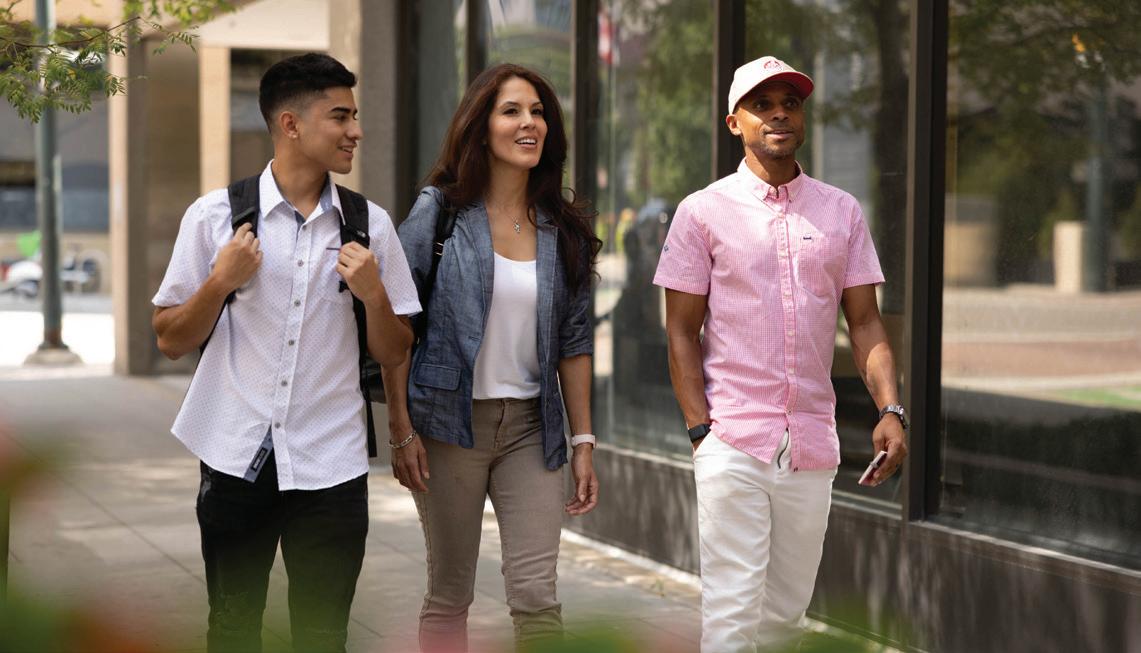
ABOUT Edge is published annually by the University of Colorado Denver School of Education & Human Development for college alumni and friends. Send correspondence to Julia Cummings, CU Denver School of Education & Human Development, Campus Box 106, P.O. Box 173364, Denver, CO 80217-3364.
© 2022 University of Colorado Denver

Dear alumni, colleagues, students, friends, and supporters,
I gladly stepped into the role of fifth Dean of the School of Education & Human Development (SEHD) this summer. I was attracted to CU Denver’s equity-serving mission, its commitment to community, and its dynamic leadership. I have known for many years that the SEHD is one of the most innovative and community-engaged schools of its kind in the nation. As I have spent a great deal of time getting to know this community over the summer, I have witnessed that many of you are changemakers in action who are redefining ways to combine your passion and purpose to make a strong impact in our everchanging and evolving communities.
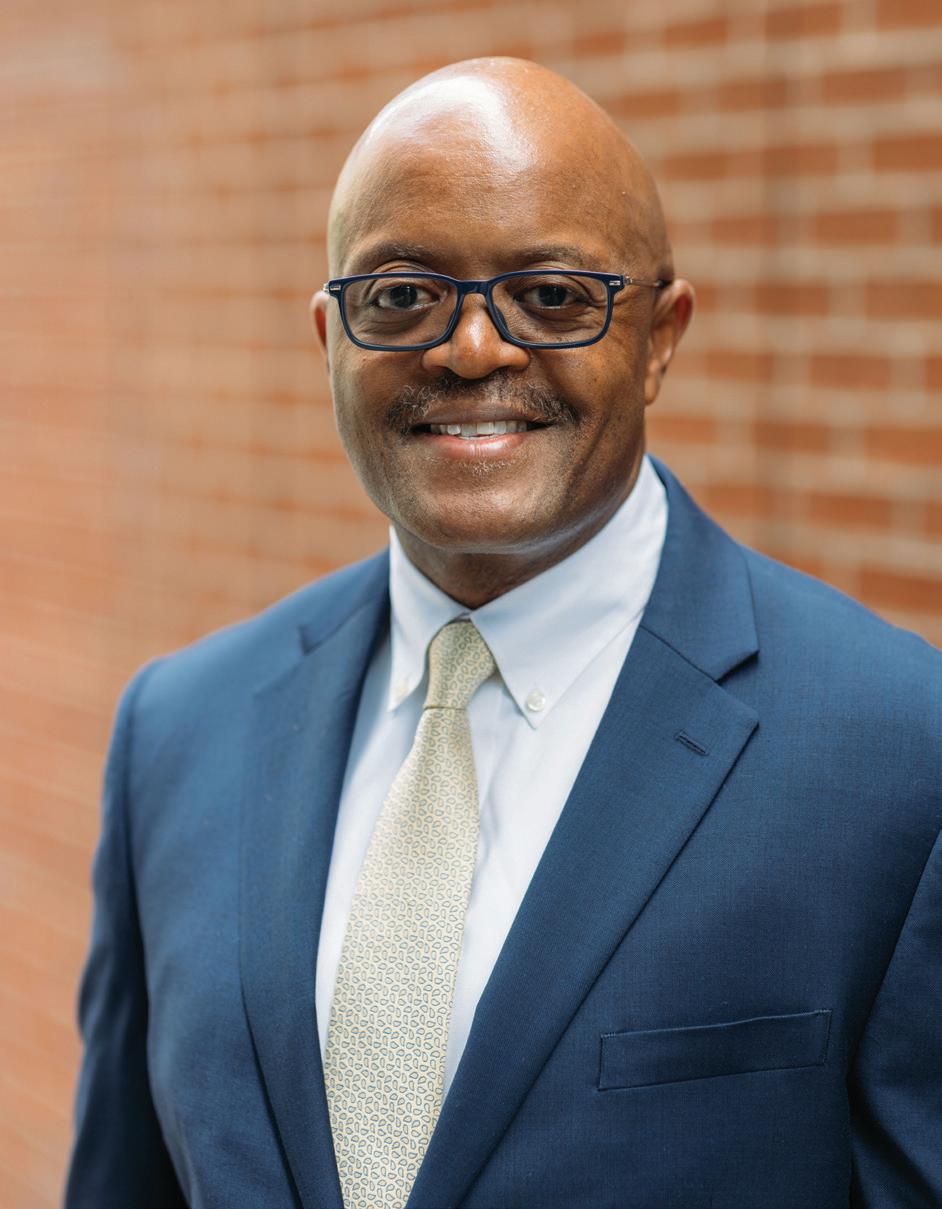
This issue of Edge celebrates SEHD trailblazers and changemakers, including alums Robin Brandehoff (PhD ’20), Karely Nava Chavez (BA Psych ’22, with a minor in Human Development and Family Relations, HDFR), Antwan Jefferson (PhD ’13), Zachary Lees, (BS HDFR ’22), Jocelyn Vangundy (BS HDFR ’21), and Lea Ziegler (BA EDHD ’18, with an initial Special Education Generalist licensure); faculty members on the front lines of progress, including Suzanne Arnold, Lisa Forbes, and Rene Galindo; and outstanding students Karen Armstrong, Rosemary Calvert, Brian DeLevie, Dan Lawrence, Jacquelyn Ray, and Niki Roberts. I could not be more excited about their accomplishments.
My colleagues and I share a deep passion for educational transformation. By the time I was eight years old, I knew that I wanted to be a teacher. My early career as an elementary teacher provided me with complex insights into the roots of historical inequities that shape current educational outcomes. As a scholar and a leader in higher education, I have endeavored to draw on the resources we bring to bear to ignite educational transformation at all levels. I am thrilled to be surrounded by colleagues who share that passion.
The SEHD has a national reputation for developing and creating innovative programs, projects, and learning opportunities for current and future students. I look forward to working with the faculty, staff, and students to continue to grow our already powerful reputation. I invite all of you to join us in that effort.
Thank you all for being a part of the marvelous SEHD community.
Dean, School of Education & Human Development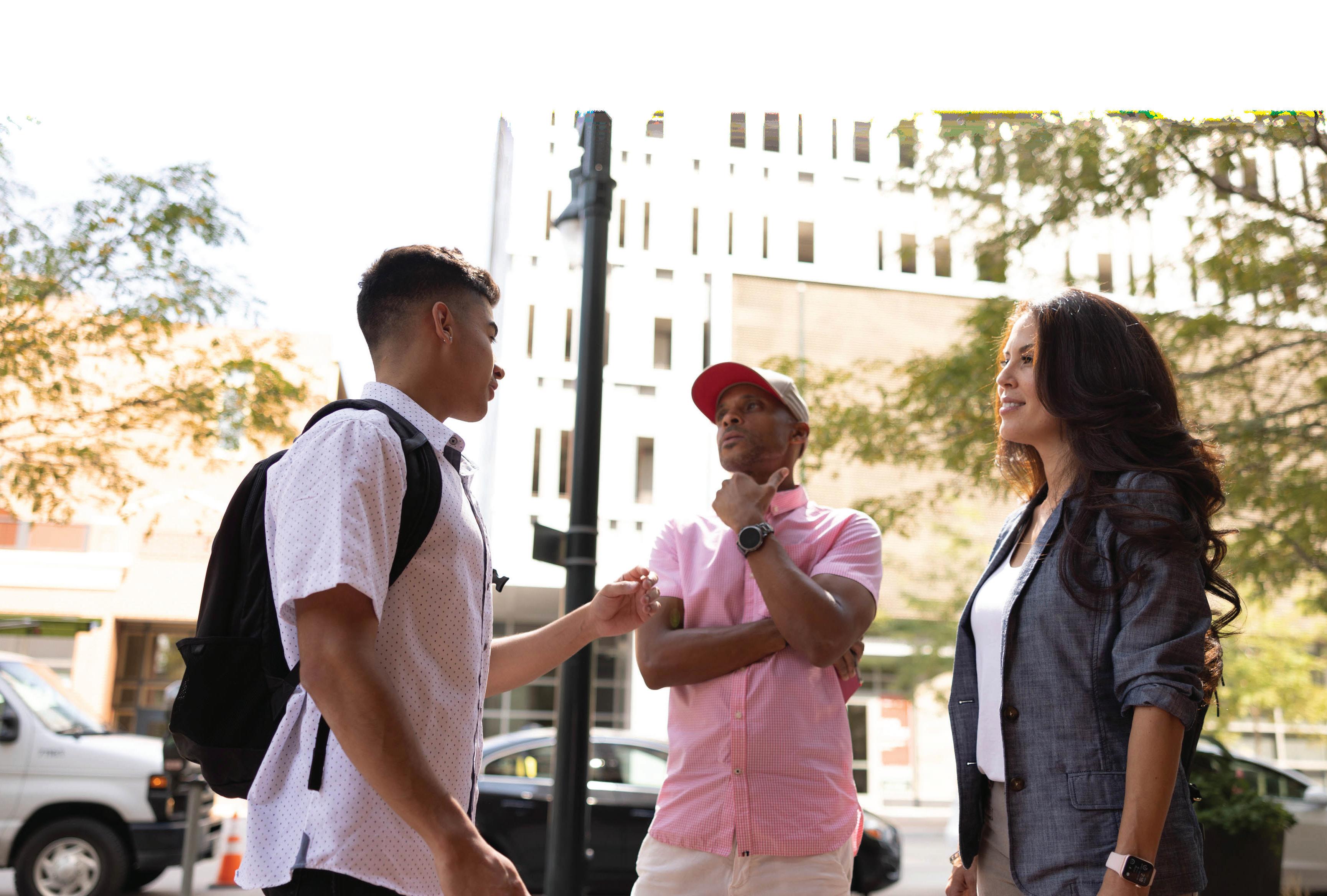

In spring 2022, Antwan Jefferson (PhD ’13) was promoted to associate dean for equity, diversity, and inclusion (EDI) in the School of Education and Human Development (SEHD). Jefferson leads and collaborates within SEHD and across campus to guide the vision and strategic planning to instill EDI into overall operations and within the programs and pedagogies experienced by students.
“I’m grateful that everyone at the university seems to be looking in the same direction for once, and I’ve never had that experience since I’ve been here,” said Jefferson. “SEHD has been thinking about social justice and equity for a long time, but now that so much of the university is thinking about diversity, equity, inclusion, and justice, it is becoming common language, and that makes me hopeful that measurable, observable, courageous transformational change is possible for students, staff, and faculty.”
He added, “Sometimes people in a role like mine feel the pressure to do all the EDI work on their own, which is untenable. It does not feel like that to me, and I presume it never will. There is a collective energy around becoming equity-serving that gives me a pragmatic sense of relief that these goals are possible. It will take all of us. People understand that. To me, that is the most critical component of it being possible. We have shared goals, and I am the person who is going to try and do all the collecting of people’s ideas.”
Many in the CU Denver community are familiar with Jefferson from his years of engagement.
He earned his PhD in educational leadership and innovation in 2013, following completion of a dissertation entitled “(Un)Invited Families: Locating the Institutional Power of School at Work Against the Involvement of Families.” From 2020 to 2021, he co-chaired the university’s Equity Task Force. In 2021 and 2022, he co-chaired the Institutional Equity Advocacy Council and was an Equity Fellow in the Office of Diversity, Equity, and Inclusion. In 2019, he was named a TIAA Chancellor’s Urban Engaged Scholar.
In his spare time, Jefferson is the editor-in-chief of the Denver Journal of Education and Community , as well as a board member for Denver Metro Community Impact, Colorado Youth Congress, and Mile High Ministries.
This fall, Jefferson relocated his office to Lawrence Street Center, Room 711. His new meeting space is student-facing and easy to access. To make an appointment with him, or his graduate assistant Valerie Richmond, please visit education.ucdenver.edu/EDI.
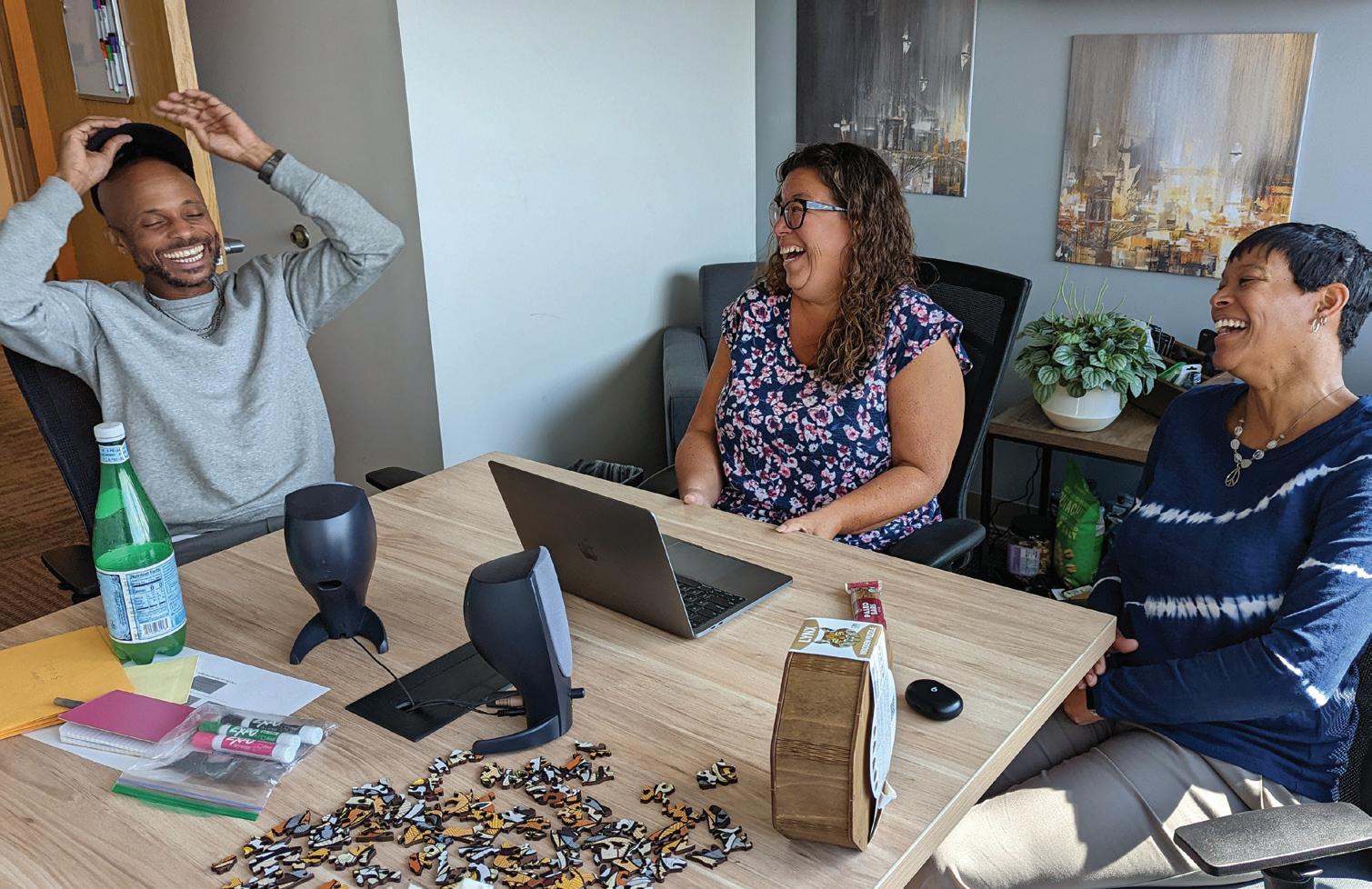
In the coming year, Jefferson will emphasize two primary goals:
On SEHD Climate and Culture
In order for SEHD to successfully serve every one of our diverse students and support the professional successes of all members of our diverse faculty and staff, the structural, instructional, professional, and interpersonal features of SEHD must be informed by needs at individual and organizational levels.
On Uses of Curriculum and Instructional Practices
Throughout SEHD, teaching and learning are critical practices at the nexus of nearly all that we do as a professional and interpersonal community of students, staff, and faculty.
In future years, he will focus on additional key priorities:
FURTHER DEVELOPING AN EDI PRACTICE AND SCHOLARSHIP AGENDA IN SEHD
Developing and executing pedagogical changes to support grants, programs, and activities that advance awareness of diversity, equity, and inclusion with internal and external stakeholders.
Building new and existing partnerships through increasing awareness of SEHD’s commitment to equity, diversity, and inclusion. This will include work with the Office of Disability Resources, the Center for Faculty Development and Advancement, the Center for Excellence in Teaching and Learning, and the Center for Identity and Inclusion, to learn from, among, and with these centers as to how the work might be harmonious with the campus strategic plan.
“It will take all of us. People understand that.”Antwan Jefferson with staff members Shelley Gomez and Shakira Anderson
A team of doctoral students in SEHD have created a new peer-reviewed academic Open Educational Resources (OER) journal entitled Cases on Leadership for Equity and Justice in Higher Education . It is the first doctoral-level and student-run open access journal published through CU Denver.

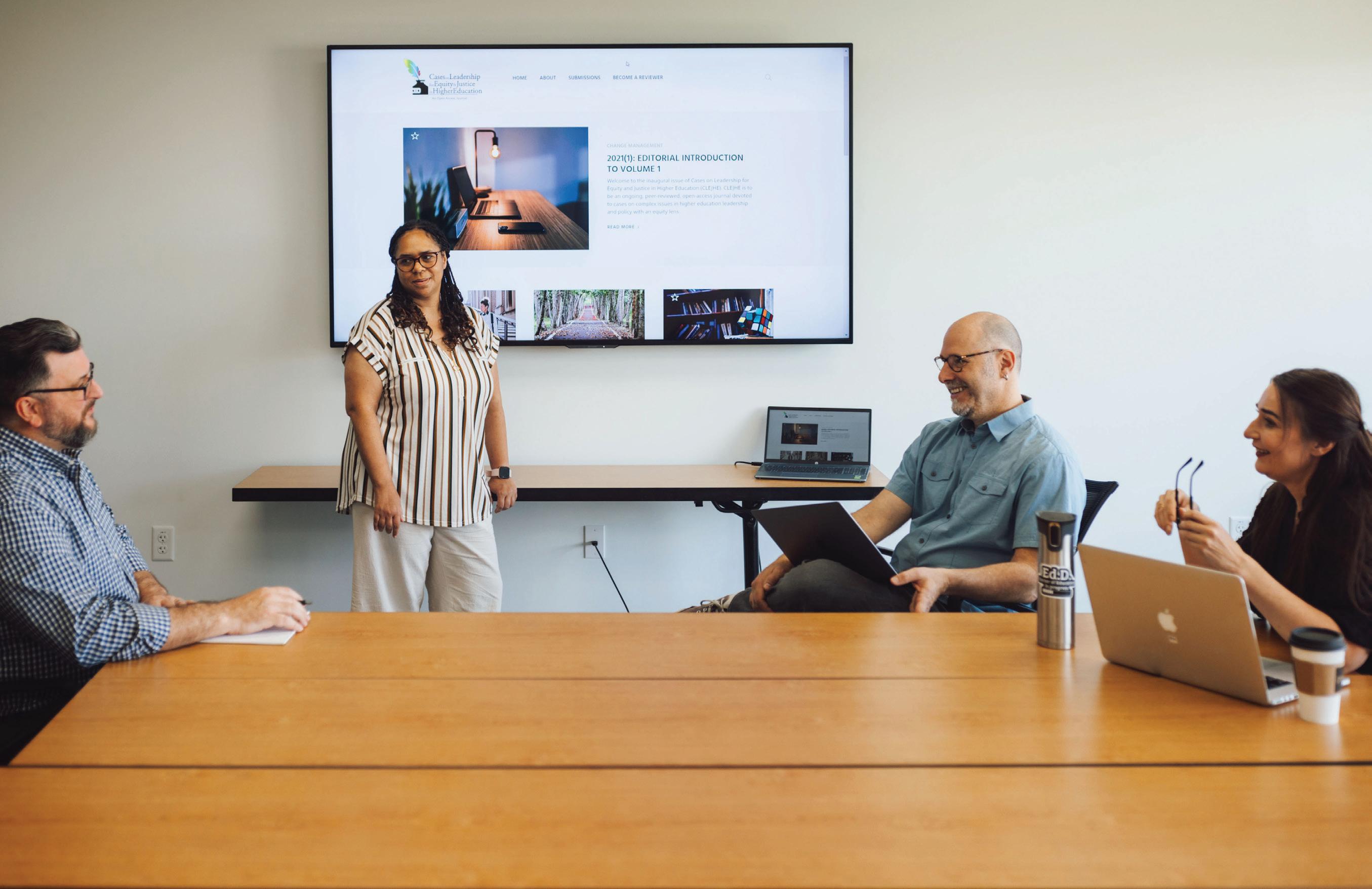
 EdD students (left to right) Brian DeLevie, Karen Armstrong, Dan Lawrence, and Jacquelyn Ray discuss production of the next volume of Cases on Leadership for Equity and Justice in Higher Education.
EdD students (left to right) Brian DeLevie, Karen Armstrong, Dan Lawrence, and Jacquelyn Ray discuss production of the next volume of Cases on Leadership for Equity and Justice in Higher Education.
The journal is devoted to the rapid dissemination of case studies involving higher education leadership. It is run by an editorial board and team of doctoral students and a faculty oversight committee in the Leadership for Educational Equity-Higher Education EdD program. It is available through a Creative Commons license to support a greater global exchange of knowledge in higher education.
Volume 1 came together quickly and successfully, even during the pandemic. The first editorial board of Higher Education doctoral students, including Dan Lawrence, Jacquelyn Ray, and Brian DeLevie, have set a goal of publishing the journal biannually. The team enjoyed the shared leadership model that brought together students and faculty from multiple cohorts of the doctoral program as authors, reviewers, advisors, and editors.
“Serving as editors has given us a privileged vantage point into the current issues and challenges facing our field,” said Lawrence, who is director of library services for the Community College of Aurora. “It has been an honor to work on an open access publication that has the potential to encourage the use of equity-focused cases in higher education leadership studies.”
EdD students Jennifer Husum, Erin Hutchinson, and Janell Oberlander-Haefs provided further editorial support for the production.
Student journals of this type are common in law schools, but they are rare in education doctoral programs. “I’m not aware of another student-run journal in higher education exclusively,” said Scott Bauer, PhD, associate dean and faculty member in SEHD’s Leadership for Educational Organizations program. “We made a commitment to use cases as a part of our signature pedagogy in our Higher Education concentration. Students write cases as part of their learning experience in one of their first courses in the program. The creation of the journal naturally dovetailed.”
The journal includes novel higher education case studies that are written to be accessible to wide audiences, including students and faculty. EdD students and their faculty advisors solicit manuscript submissions, provide scholarly feedback, and edit, piece together, and publish the journal. The process follows the double-blind peer review policy, where the identity of the author is not revealed to the reviewers and vice versa. This helps students receive the experience of providing or accepting peer review advice and allows them to share their scholarly writing. Every case study was reviewed by at least three people, primarily students, and at least one faculty member or advisory board member.
The first volume’s content features cases on organizational change, student enrollment, change management, organizational leadership, and student success. Two of the three editorial board members have library science backgrounds and know the ins and outs of online publishing.
Diane Hegeman, PhD, a member of the journal’s faculty oversight committee and program faculty member, sees immense value in open access higher education case studies. “As tuition and textbook prices increase for students at all levels, creating OERs can help minimize costs for students everywhere,” said Hegeman. “Our goal is to provide current and relevant cases that apply to higher education issues of today, and using this format allows us to do so without using textbooks that become outdated quickly. Cases with this amount of depth and breadth can be used as teaching tools. They are extremely hard to find in higher ed contexts.”
The journal’s production is made possible through the work of Brad Hinson, Dennis DeBay, Remi Kalir, and Sabina Sariyska in ThinqStudio and two OER grants from the Colorado Department of Higher Education, totaling $60,000, received in 2020 and 2022. The grants have solidified the required technology infrastructure to produce the journal and bring additional online publications on board for what the university is calling ThinqStudio Open Press. OER is a core goal of the new digital education strategy at CU.
“We’re thrilled to see our OER grant program come to life through CU Denver’s graduate student–led open journal,” said Kim Poast, PhD, chief student success and academic affairs officer for the Colorado Department of Higher Education. “As a faculty member in the Higher Education for Educational Equity program, it is even more inspiring to witness the convergence of state-level policy, institutional practice, and scholarship. We look forward to the expansion of this important work.”
Individuals interested in submitting case studies for consideration should follow the submission guidelines at https://clejhe.cu.studio/submissions.
Volume 2 was released in September 2022. To access the journal and download free higher education case studies, visit https://clejhe.cu.studio.
As a child growing up in Buffalo, Zac Lees (BS HDFR ’22) cherished his family and friends, excelled in music, loved sports, and thrived in school. But in high school, he experienced bullying and struggled emotionally. “I started to make some risky decisions as I fought to properly deal with difficult emotions,” said Lees.
While attending Alfred University from 2010 to 2011, Lees experienced some mental health struggles and soon decided that enlisting in the U.S. Marine Corps might help him turn things around. He started boot camp in South Carolina in spring 2012.
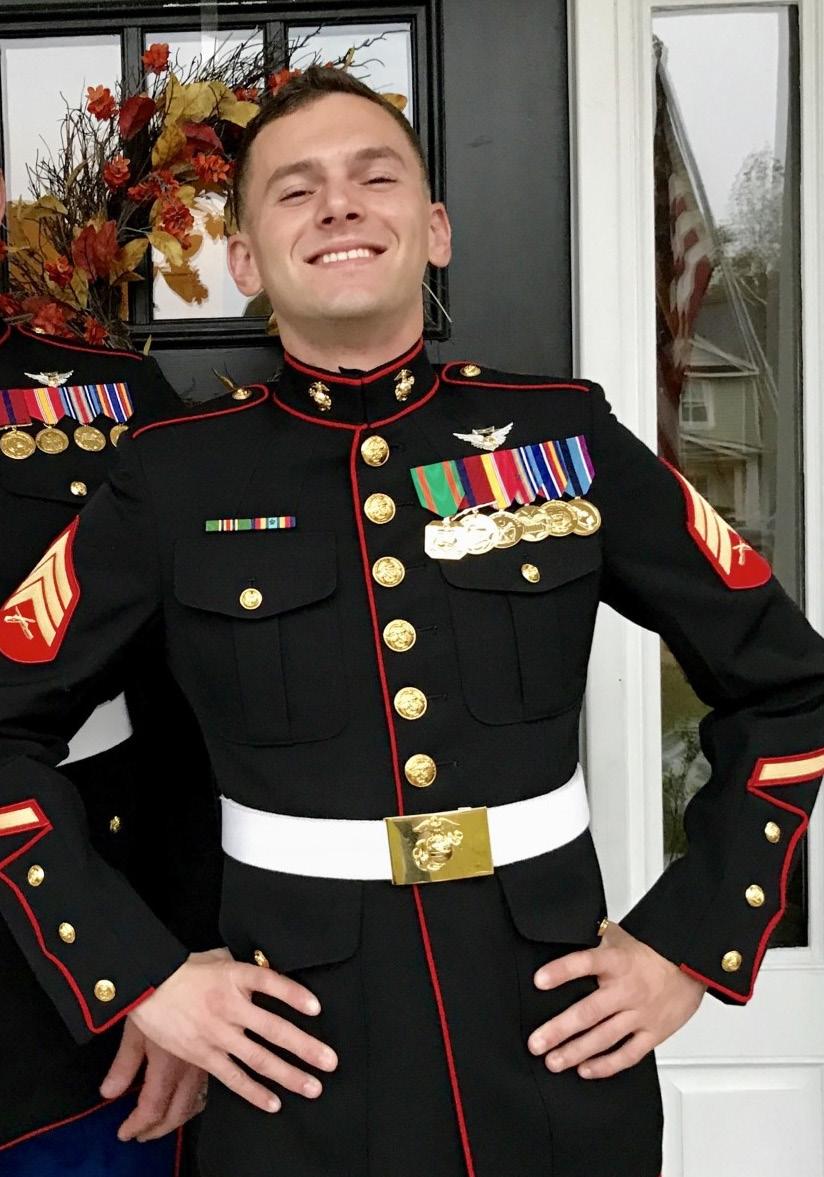
Interested in aviation, Lees was designated as a crew chief. He attended survival training in Maine and flight training and mechanic school in North Carolina. He was deployed in 2014 to the border of Africa and the Middle East, where he served as the youngest person in his Military Occupational Specialty (MOS) before returning to base.
“During my year back in North Carolina, between my deployments, I earned my remaining mechanic and flyer qualifications and had to pick 12 flyers to supervise during my second deployment, where I was top guy in my MOS,” he said. “I had to grow up very quickly.”

That deployment, from spring 2016 to fall 2017, sent Lees back to the Middle East as a weapons and tactics flight instructor, enlisted operations manager, and a CH-53E helicopter tail gunner patrolling borders for an antiterrorism unit. He also served in a seven-week humanitarian mission to Haiti in the aftermath of Hurricane Matthew in October 2016, delivering food, medicine, shelters, and other needed supplies.
Honorably discharged on Christmas Day 2017, he began deliberating ways to use the GI Bill to attend college for free. “There was something about Denver that had a freeing, vivacious energy,” said Lees. He enrolled as an accounting major at CU Denver in fall 2018.
“For a while, things were great,” Lees said. “I was landing internships meant for seniors at private equity firms.” But he began falling behind as underlying problems surfaced, and he took a year’s medical leave.
He sought help through the Department of Veterans Affairs, through school, through family and friends, and his partner, Michael. “I found a great therapist, got on antidepressants, and started some alternative treatments, all of which were really helpful,” Lees says. “I came out the other side almost a different person. I owe much of that to Michael.”
Hoping to do something meaningful to help troubled youth, he changed his major to Human Development and Family Relations (HDFR) and made a fresh start at CU Denver in spring 2020. His experiences in this program helped transform a vague yearning to work with youth into concrete career objectives.

An internship he landed with the Denver nonprofit Project PAVE (Promoting Alternatives to Violence through Education), in November 2021, helped hone his future goals. There, he worked with supervisor Brent Adams on PAVE’s True Man program, which is sponsored and funded by the Denver Broncos. They met with middle-school football teams involved in the Broncos’ Futures Football Program, in three weekly, 90-minute sessions, to deliver curriculum focused on gender identity, self-acceptance, and healthy masculinity.
The curriculum helps young men develop self-awareness and empathy, and find healthy outlets for channeling difficult emotions. “Similar to the military, in the context of football, there’s this rhetoric around being violent and masculine that provides an ideal opportunity to talk about these things,” Lees said. “By the end of our sessions, some boys open up about their home life situations or mental health and
relationships issues. It is incredible to widen their viewpoint and help them see that no matter what they are or wish to be, it’s okay.” Lees is especially grateful to professors, such as his HDFR professor, Ruben Anguiano, PhD, and instructor Jennifer Grieving, “who provided so much and expanded my ideas for options after graduate school.”
“There were times I was falling behind on homework, and it would be easy for them to give a zero,” said Lees. “Instead, they would send me an email to say, ‘Hey, just checking in to see if you’re doing okay.’ When I had no energy to get out of bed for days at a time, those emails helped me remember people care. I didn’t give up on myself, but I wouldn’t have gotten to that point if my faculty hadn’t stuck with me as well.”
Lees is currently enrolled in a graduate social work program at Metropolitan State University of Denver. His goal is to work one-on-one with high school–age students as a school counselor or therapist.
“It is incredible to widen their viewpoint and help them see that no matter what they are or wish to be, it’s okay.”
Feeling caught on a hamster wheel in teaching?
Lisa Forbes, PhD, SEHD clinical assistant professor of counseling and co-founder of the global faculty network Professors at Play, has a novel perspective to break traditional molds. The perspective is based in play, which she likens to fertilizer for the learning brain.

“Play creates a powerful learning process,” said Forbes. “When we play, we feel joy and laugh, which reduces stress and anxieties. When that happens in the presence of others, a sense of trust and community is built. Those bonds give us confidence to exist outside of our comfort zones. Then we are more willing to enter difficult conversations or vulnerable learning scenarios. All that leads to meaningful learning.”
For more information about CU Denver’s Counseling program, visit education.ucdenver.edu/counseling.
She said that brain science tells us that “what wires together fires together,” and the more we play, the more our brains are reshaped to have a better sense of wellbeing and capacity to handle stress.
“This is huge for learning because significant and unnecessary stress limits our ability to learn,” said Forbes. “At the same time, neuroscience has identified that neurotransmitters, such as dopamine, norepinephrine, acetylcholine, and oxytocin, strengthen neuroplasticity, the central process to learning. These neurotransmitters increase motivation, attention, memory, safety, and trust. If we can better shape the learning environment to encourage those types of neurotransmitters in students’ brains, we can better support their learning.”
Forbes is dedicated to accomplishing the learning goals set by the counseling accrediting body and her field, yet in a way that awakens students’ natural curiosity for learning. Her understanding of play in her teaching is flexible, by playing with ideas, design, and creating novel ways of presenting concepts. She thinks of it as “as bending the rules without breaking the game.”
“Play provides me structure to challenge the status quo and norms of academia,” she said. “Traditional education excludes and devalues some learners, but play, in my experience, allows for more inclusivity and ability to better engage students who typically feel marginalized in learning. Play is open, flexible, and creative so it allows more students to find belonging and individualize their learning.”
Forbes takes typical classroom activities and assignments and adds elements of play, which transforms the students’ relationship to learning and makes the material more intriguing. She incorporates humor and surprise, and even carries around little pouches of stickers as prizes.
She has incorporated a “Martian mission” exercise where her students pretended they were sent to Earth to help the earthlings solve their biggest problems related to the content of the course. She recalled that the Martian activity especially had students cracking up because she made a video of herself with a Martian-like filter describing their mission.
One successful icebreaker she implemented involved balloons and fly swatters. During another semester, she asked students to respond to reflection questions by writing answers on paper airplanes and sailing them in her direction. She turned the children’s book Giraffes Can’t Dance into a mental health case study. Most recently, she created an escape room as a more engaging way for students to learn about a professional counseling organization. She even allows students to turn in some assignments using nontraditional methods, such as creating their own podcasts or pop culture blogs.
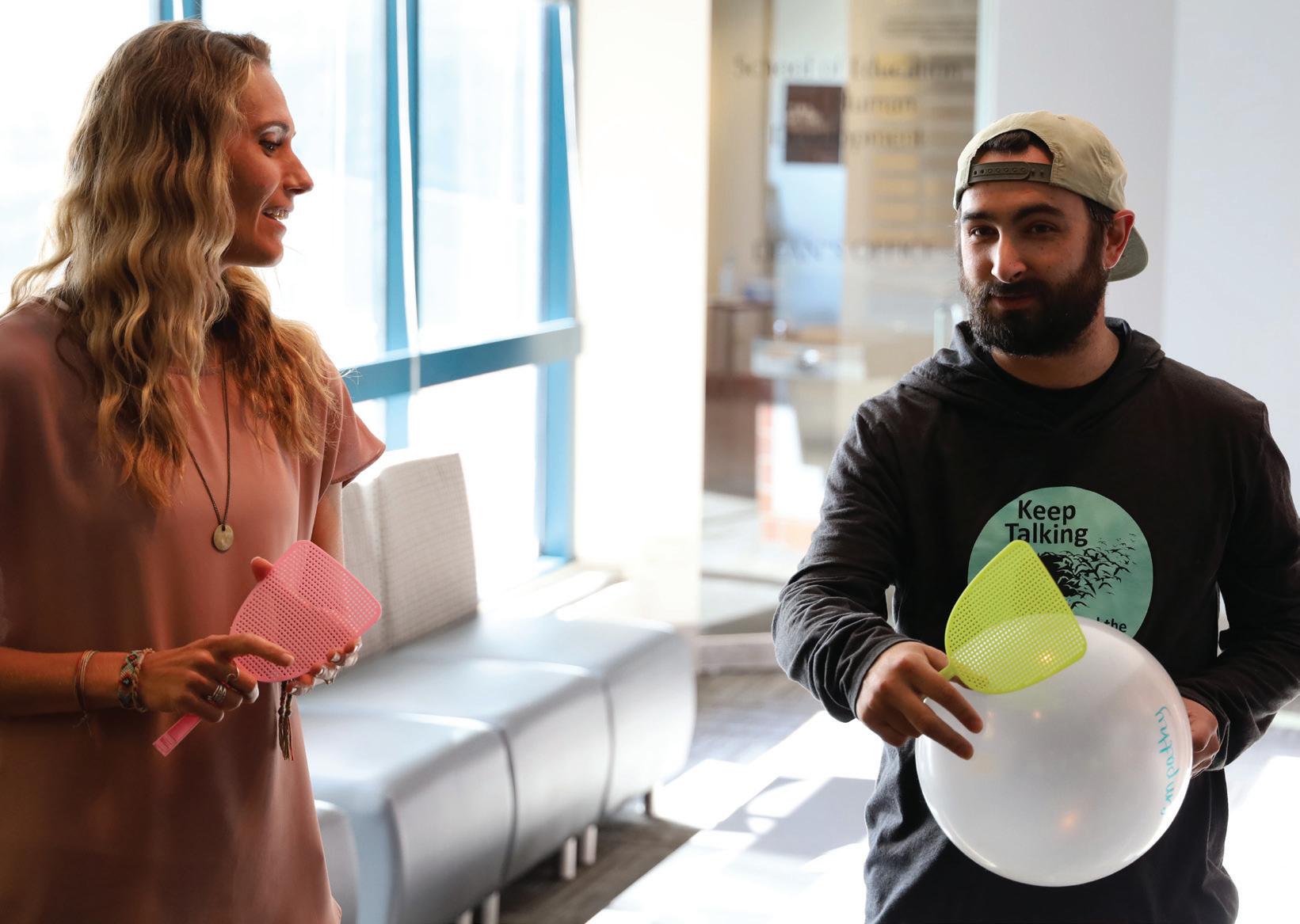
While a lot of this sounds like pure fun, Forbes was clear that it is not frivolous. “People hear playful pedagogy, and they think that seriousness or rigor cannot coexist. Play is more valuable and complex than that. Play can be fun, but play can also be serious. Play can be rebellious because it challenges what is. Play allows me to have higher expectations of my students and positions me to give them honest and critical feedback because there is greater safety and trust. I have found the depth of work my students are willing to do and the quality of assignments they submit are full of effort and passion because they are bought in. That is the power of play.”
Professors at Play is an online community launched in 2020 by Forbes and colleague David Thomas. In two years, this Google listserv has grown to almost 800 members from the United States, Australia, Egypt, United Kingdom, and all over Europe. Forbes welcomes individuals to explore the website for inspiration and permission to play.
Her recent research includes an article in the Journal of Teaching and Learning entitled “The process of playful learning in higher education: A phenomenological study,” and two reads in the online newsletter Faculty Focus: “Fostering Fun in Asynchronous Classes!” and “A Game Day.” Forbes and Thomas coauthored the book The Professors at Play Playbook , published by Carnegie Mellon Press this fall. It provides rationale for playful pedagogy in higher education with supporting examples from 68 contributors.
“Play creates a powerful learning process.”Lisa Forbes and counseling student Luke Freccero during an in-class balloon activity that spurs playfulness and meaningful discussions.
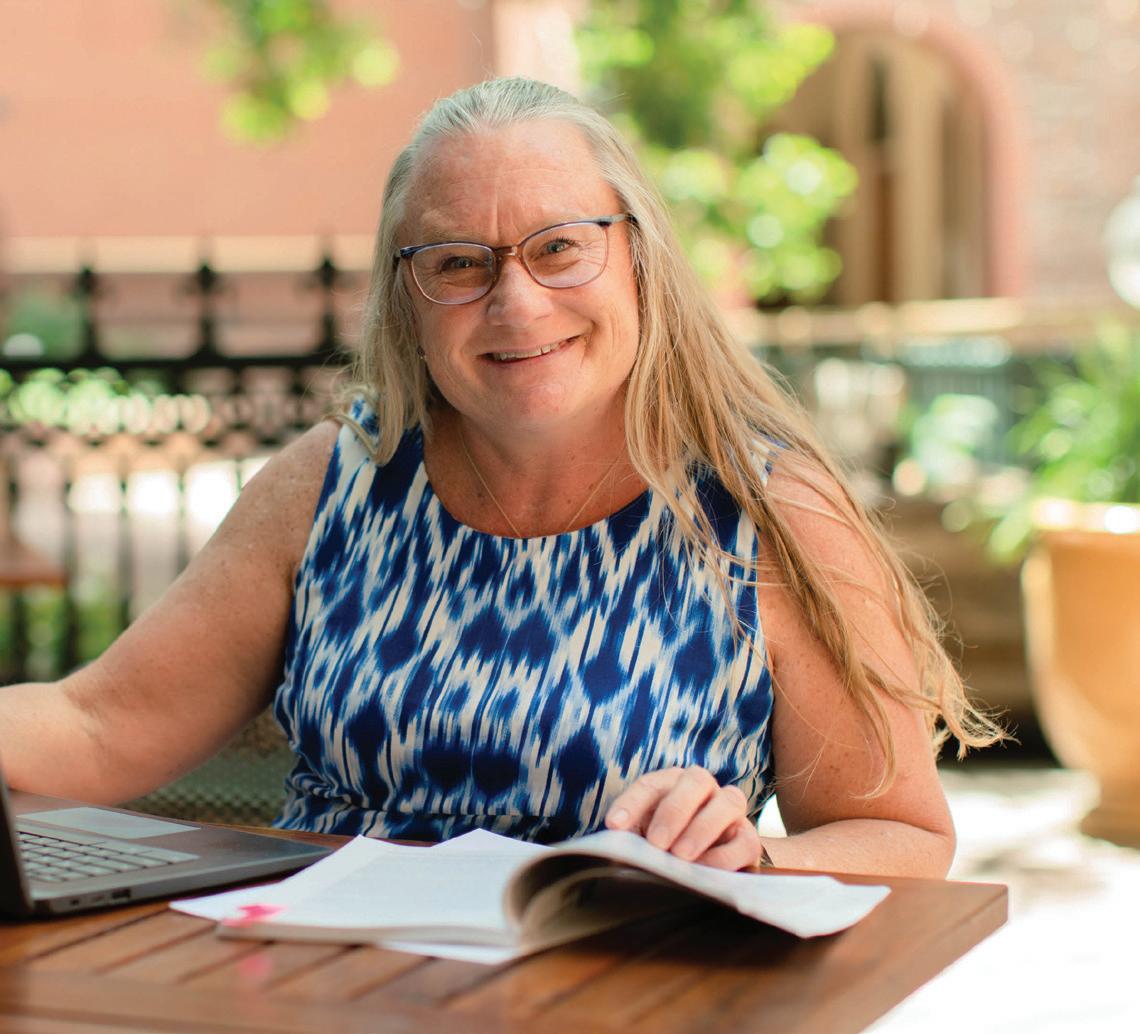
Rosemary Calvert (above) and Niki Roberts. Facing page: NxtGEN students
NXTGEN PROVIDES
Rosemary Calvert and Niki Roberts, new students in the NxtGEN undergraduate teacher education program, have embarked on a meaningful career journey that will help them achieve teaching licenses and family-supporting wages. Both are veteran paraprofessionals in the St. Vrain School District (SVVSD). Professional development courses, offered at no cost to classified staff in the SVVSD community through the P-TEACH professional program, provided a pathway to expand their credentials and career opportunities through CU Denver.
NxtGEN, led by director Arianne Rivera, was elevated last spring in a U.S. Department of Education fact sheet as a top teacher education program in the country that is addressing the teacher shortage and increasing the number of teachers prepared for diverse classrooms. The program leverages paid internships, a yearlong residency, strong equity-focused curriculum, and wraparound supports.
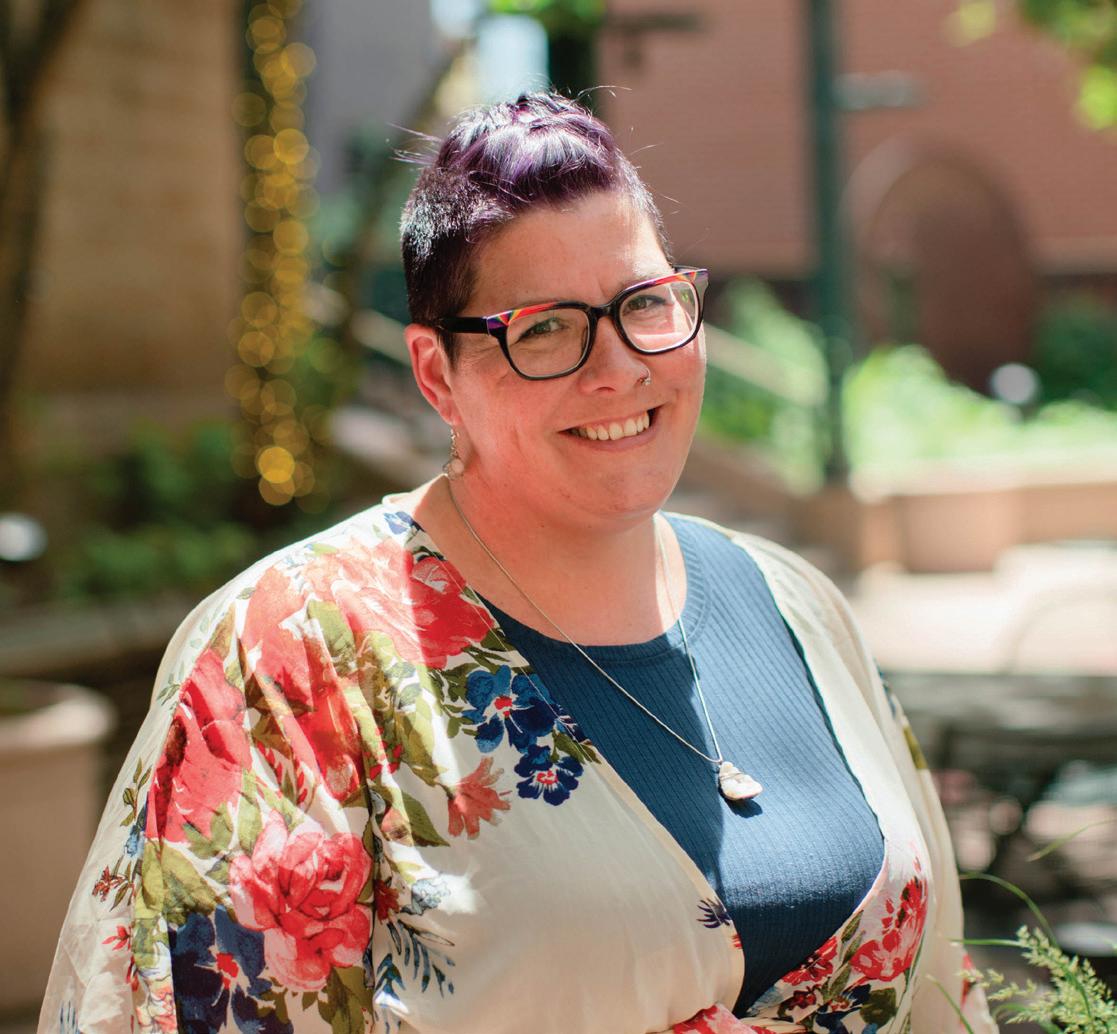
“Niki and Rosemary were recruited into the NxtGEN program because they are passionate, dedicated, and have already committed their careers to educating others,” said SEHD alum Nicole Rudman, MA ’02, Buell Early Childhood Leadership certificate ’16, EdD ’19, P-TEACH apprentice coordinator, and instructor in SVVSD. “They both have such a heart for working with children and amazing leadership potential to achieve their goals. Really, all they need is a teaching certification, and the credentials that come with it, so they can have their own classrooms. To date, they just have not had the opportunity to pursue the educational pathway to finish that piece.”
For more information about NxtGEN, visit education.ucdenver.edu/nxtgen.
Calvert’s journey into teaching began at Twin Peaks Charter Academy in 2009, where she was a regular enthusiastic volunteer in the classrooms of her three children. “I was volunteering so much that the school staff asked me if I’d like to work there,” said Calvert. She enjoys being on the “front line” to discover how humans learn, especially by using hands-on small group math sessions to support students who are on IEPs (individualized education programs) and 504s.
“Working in education provides a sense of safety, connection, belonging, change, and variety; but what I love most is the far-reaching impact that one educator can make,” said Calvert. “It truly has been my happy place over many, many years. And, in terms of supporting children through special education, are we not all special and unique in the way that we learn? Each one of us learns in diverse ways. Some need greater support than others, but we all need support. No one does it alone. We all draw from each other’s experiences, background, and culture to come to develop the knowledge and social-emotional skills that we can apply to life.”
In mid-2020, Calvert made the decision to finish her BA, just as her youngest child moved on to college, because one of her strengths is sharing knowledge. The SVVSD human resources team recommended the P-TEACH program, which offers 10 education courses at no cost, all of which can be applied to an education degree through NxtGEN. “I’ve admired the teachers I work with,” said Calvert. “And now I can become part of that group.”
Roberts never considered teaching as a profession until a relentless mentor kept encouraging her to pursue it, with Roberts eventually earning an associate’s in early childhood education (ECE) in 2009.
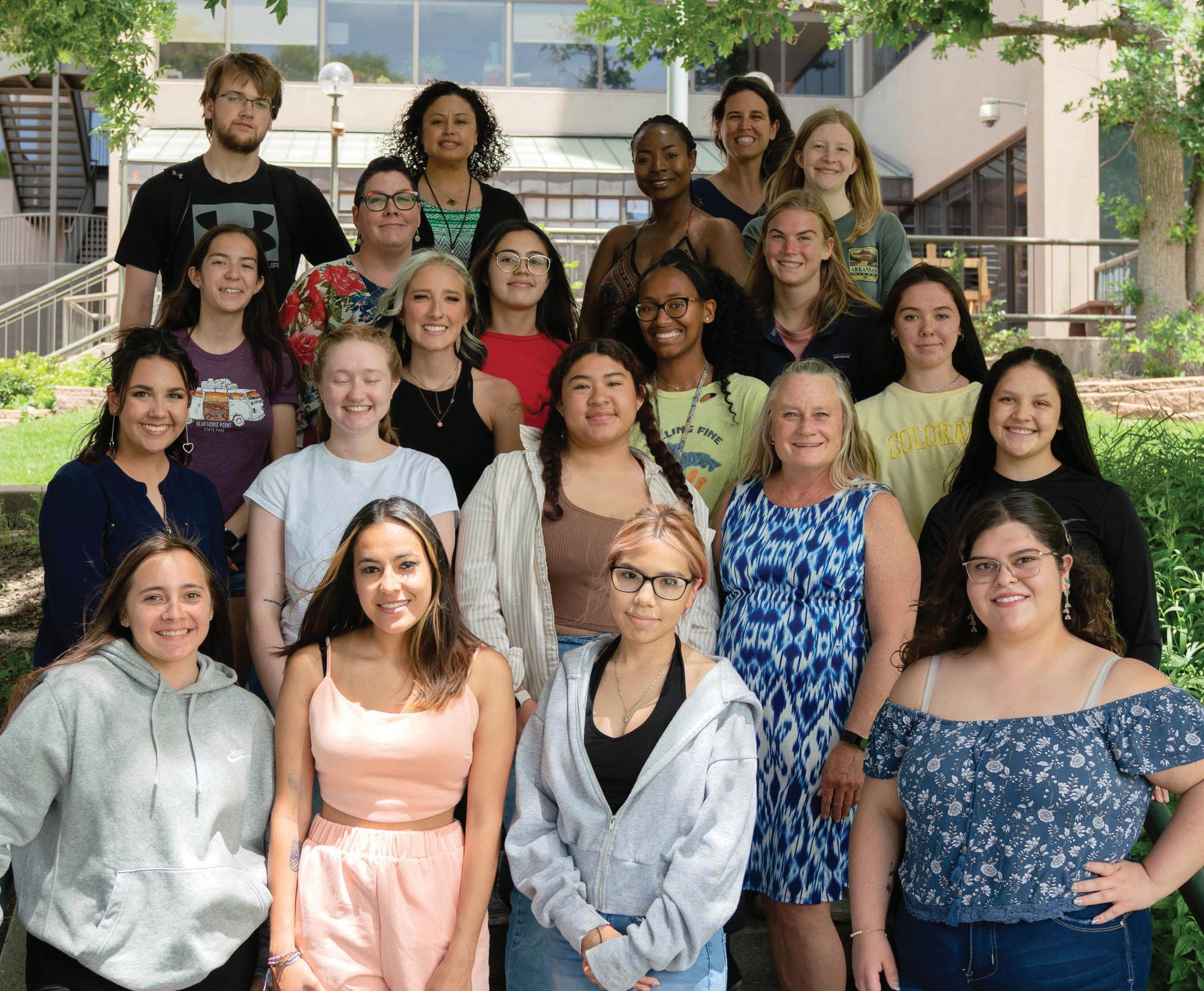
After working in the private sector as a preschool teacher, Roberts now wants to move from a paraprofessional ECE role to teaching the youngest learners in her public school. Working with children on the autism spectrum provides a great way for her to integrate hands-on activities into projects with children, from open-ended art and sensory activities to dramatic play and interactive literacy activities. It also provides her with a different understanding of what equity can look like in learning settings. Equity conversations with young kids sometimes go like this: “Well, I want a wiggle cushion. I want that fidget. Where’s my slime?”
After taking a P-TEACH course last year called “Language, Power, and Identity,” she decided to pursue a bachelor’s degree through NxtGEN. “It was so wonderful that this college-level course aligned with what I feel in my heart and how I live my life. I enjoyed sharing my voice and hearing other folks’ voices around how to change ECE and elementary education moving forward. Miss Howie, as we call her, opened students’ minds and created a safe space where students could really sit with scratchy conversations and love it,” said Roberts.
“I think educators are special people,” said Roberts. “It isn’t just a job. It’s like a heart-guiding role. You’re never doing it because it’s a lucrative position and you’re rolling in the money. But you will be gifted every day with knowing that the work you’re doing is productive and it is reaching the result that you want it to reach. So, we’re superheroes, and we need more. I need reinforcements. I’m in my 40s, and I’m going to do this. It’s never too late to get a teaching degree.”
“I think educators are special people ... It isn’t just a job. It’s like a heart-guiding role.”
Transformational learning experiences at CU Denver have many story lines. In this case, first-generation Latinas Karely Nava Chavez and Jocelyn Vangundy experienced major shifts in self-empowerment to pursue graduate studies after organizing and co-leading an online mentoring group for CU Denver students of color during the height of the pandemic.
In the spring and summer of 2021, Chavez, BA Psych ’22 with a minor in Human Development and Family Relations (HDFR), and Vangundy, BS HDFR ’21, witnessed their peers struggling with isolation during COVID. “Some students were not engaged in class and were giving heavy reasons for not attending class,” said Vangundy.
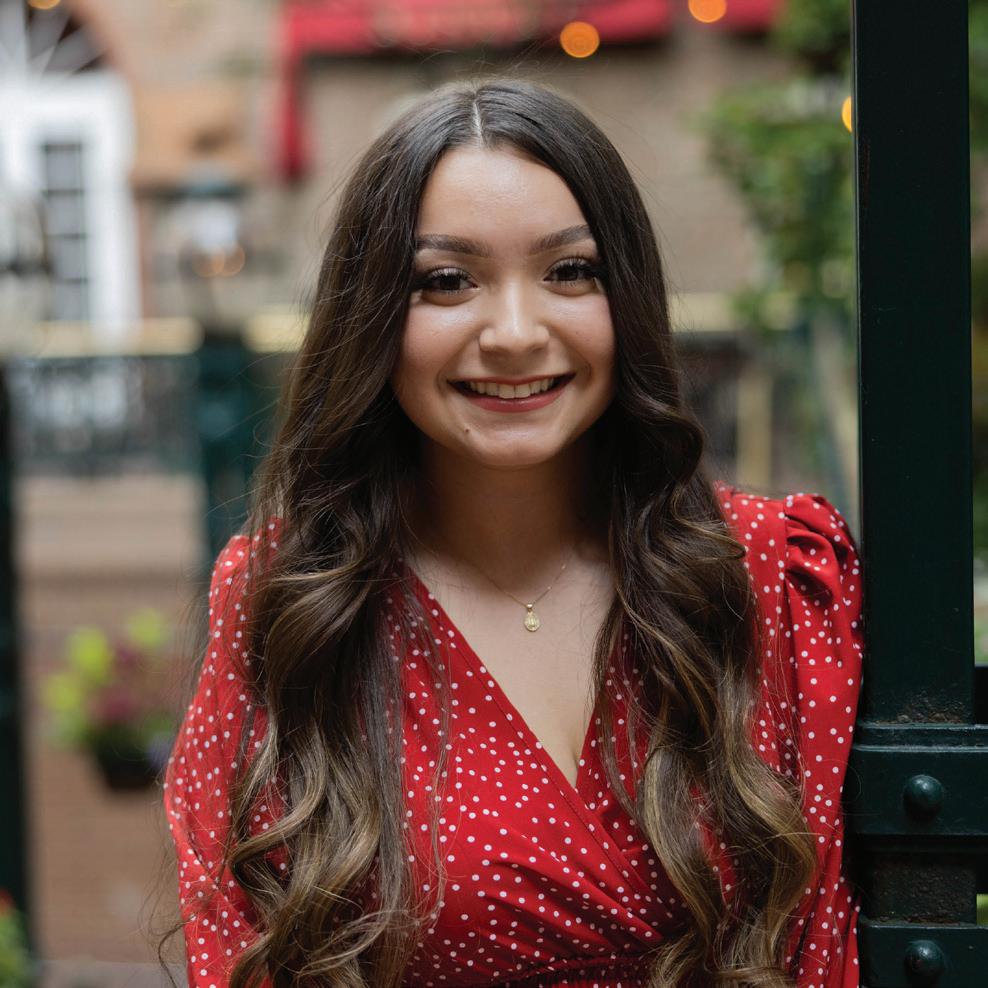
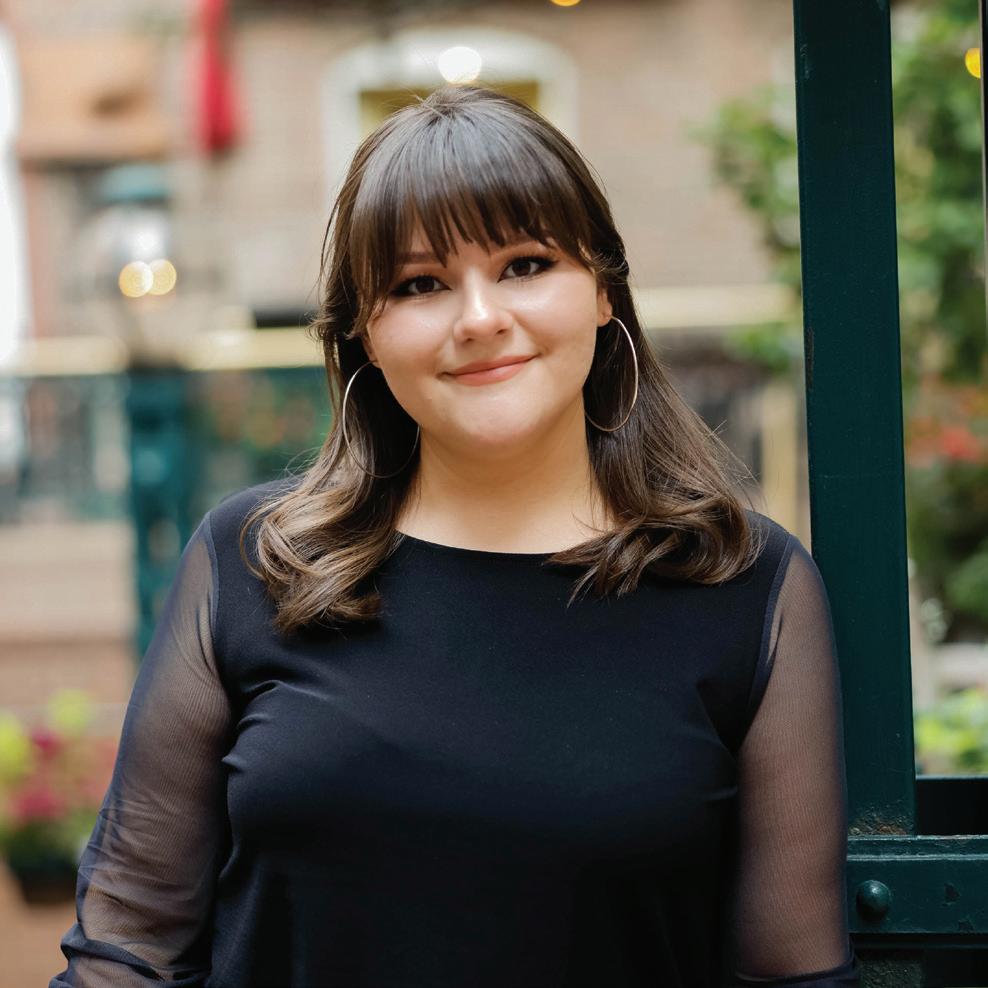
After conducting a needs assessment to ascertain the best way to provide friendly support to undergraduate peers, Chavez and Vangundy launched the support group project SocialEmotional Peer Dialogues in fall 2021. Their main goal was to provide a safe place where students could really open up, engage in emotional “soul work,” share a sense of community, and encourage one another’s persistence during a time of limited social-emotional support for students of color, whose academic studies were most impacted during the pandemic.
Recently retired SEHD associate professor Dr. René Galindo provided inspiration, reflection, and faculty oversight for the group. Chavez and Vangundy each served as teaching assistants in Galindo’s undergraduate course. Dominic Martinez, EdD, assistant vice chancellor for the Office of Inclusion and Outreach and Undocumented Student Services, and Antonio Farias, vice chancellor for Diversity, Equity, and Inclusion, provided financial support and encouragement.
Galindo praised Chavez and Vangundy’s efforts: “It’s incredible because they saw the need to further support their peers. They provided leadership and inspired change.”
Innovative curriculum, a positive community vibe, and the supportive nature of the faculty in HDFR added to Chavez and Vangundy’s desire to help others. HDFR classes integrate theories in psychology, human development, and diversity, applying them in school, family, and community settings. “The HDFR program is really about connecting with diverse people in service of others,” said Vangundy. “We wanted to extend that feeling of a close-knit community during COVID.” She recalled her HDFR “Maymester” trip to Seville, Spain, with great fondness. It was one of her best community-building and service-oriented experiences as an undergraduate.
“I recommend the HDFR program to everybody,” said Chavez, an HDFR minor. “You can’t go wrong. There’s something for
everyone. Every faculty member I’ve met in HDFR has been a mentor to me.”
Prior to starting the support group, Chavez and Vangundy discovered literature about the nine dimensions of wellness and planned their initial peer dialogues with these dimensions in mind. “It was kind of funny because in our first semester peer dialogue sessions, our plans were pretty rigid and almost structured like an academic setting,” said Vangundy. “We had PowerPoints and then added a little bit of time for discussion or questions. Students stuck with us and they kept coming, and they would tell us, we’ve already heard this before, but we like you guys. We started figuring out that they weren’t at the sessions for the content; they were there for the people. After the sessions were officially over, we’d have three-hourlong sessions of just talking and building friendships and community.”
“Some people came for two years straight, even after graduating from CU Denver,” said Chavez. “It really felt like we were just a group of friends hanging out at the end of the day and deciding to have lunch and coffee
together. We were all equals going through a pandemic together.”
The peer mentoring experience will have positive rippling effects for the remainder of Chavez’s and Vangundy’s lives. In the heart of the project, both felt inspired to pursue careers involving mental health.
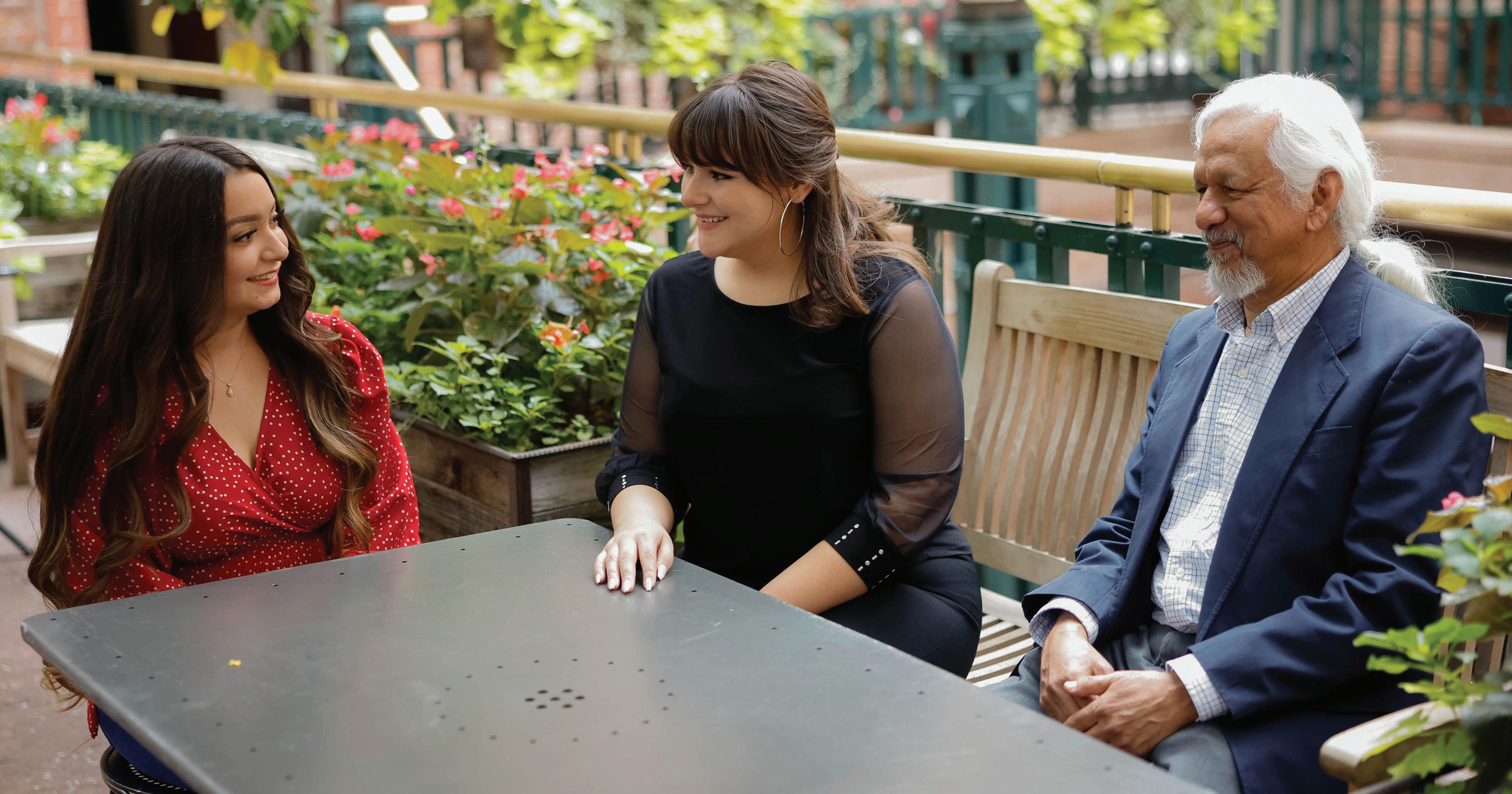
“I really discovered during that time how to best connect with people and how to create a safe space for individuals, where they feel comfortable enough to share things that have happened in their lives and what they’re going through,” said Vangundy. “I learned how to provide resources to individuals. And, this led me to the desire to pursue a career in clinical social work.”
Vangundy is currently pursuing a master’s in social work while working in the Office of Diversity and Inclusion at Metropolitan State University of Denver.
“Envisioning myself as a school psychologist is a very recent development; that evolved during this project,” said Chavez. “This experience helped solidify that I
wanted to do something around mental health, working with people, being able to talk to them, and making those connections. When I started to explore an advanced degree in school psychology, it felt like the perfect next step. And, my HDFR faculty helped me prepare my graduate application and complete mock interviews for countless hours. Meeting faculty members who are first-generation Latinos in these spaces is really empowering. Because, if they can get a doctoral degree, I feel like I can do the same.”
In fall 2022, Chavez became a doctoral student in CU Denver’s PsyD in School Psychology program, with a bilingual concentration.
For more information about the Human Development and Family Relations program, visit education.ucdenver.edu/hdfr.
For details on CU Denver’s PsyD in School Psychology program, visit education.ucdenver.edu/ schoolpsych.
“... they saw the need to further support their peers. They provided leadership and inspired change.”Above: Karely Nava Chavez and Jocelyn Vangundy with René Galindo Ferrell and Lea Ziegler
Equity-minded. Flexible. Patient. Optimistic. Fun. Lea Ziegler, BA in EDHD ’18, with teacher licensure in Special Education Generalist, emanates these characteristics as a special education professional and school leader.
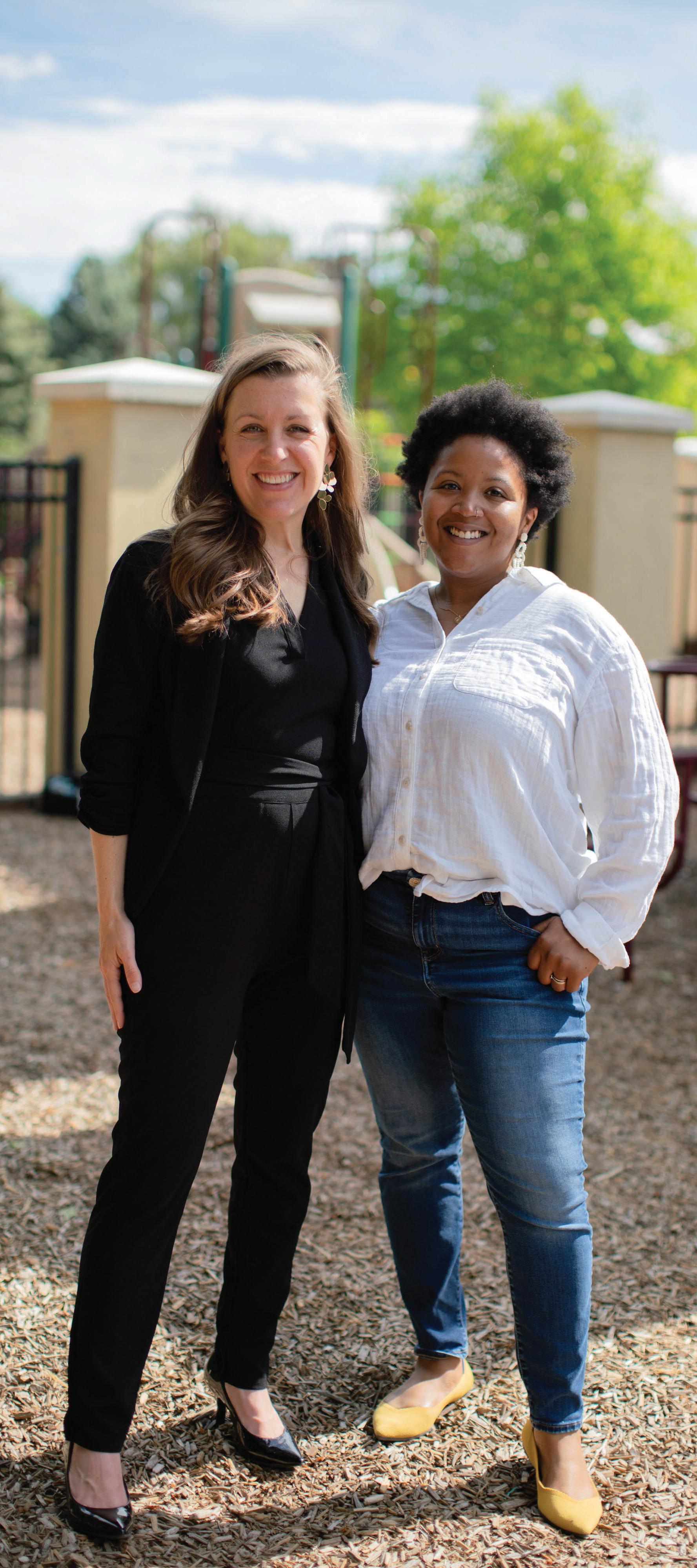
She discovered her strengths in teaching students with special needs in 2014 when she was working as a paraprofessional in a Denver Public Schools (DPS) program for students with autism. “That was when I first got a taste of instruction and the power of education,” said Ziegler. “The experience inspired me to apply to CU Denver to become a teacher.”
Ziegler was inspired to become an educator from a young age. “I grew up in St. Louis, and I was primarily raised by my grandmother,” said Ziegler. “My grandmother never learned how to read or write. I could see firsthand how much of her life was impacted by not having access to the outside world, and that really broke down her ability to absorb information and communicate. I saw her excitement firsthand while she watched me learn and read books to her. Her face would just light up.”
Today, she sees similar expressions on the faces of her students as they learn. “I love witnessing the lightbulb moments when students can really internalize that learning,” said Ziegler. “And I want to make sure that no other student goes through what my grandmother went through. All students should have access to equitable and meaningful education.”
Ziegler joined SEHD’s undergraduate teacher education program. “I loved doing the field experiences,” she said. “They gave me the ability to apply the theories and knowledge that I was learning in my classes to realworld settings.”
“All students should have access to equitable and meaningful education.”Amy
Her field experiences began at STRIVE Prep’s Ruby Hill campus in an after-school program. She then worked at Montview Elementary in Aurora Public Schools. She finished her field experiences at the Center for Talent Development at Greenlee in DPS, where she co-taught in a classroom and served as a long-term substitute while her mentor teacher took parental leave.
Ziegler bonded with Amy Ferrell, associate professor in special education at CU Denver. A connection around educational research and a desire to improve student outcomes sparked a deep friendship with Ferrell. “Oh gosh, I love her so much,” said Ziegler. “She really encouraged me to have high expectations for myself. And, when she noticed that I was interested in research, she did everything in her power to make sure that I internalized that belief that I could be a researcher and a teacher. She is constantly rooting for me.”
“Lea stood out to me as a collaborator,” Ferrell said. “Her classmates’ success was her success too. She won an award for her research study, ‘Inclusionary Practices in the Classroom,’ at the 2018 Research and Creative Activities Symposium. And now, it’s incredible to see her living out her commitment to equity in education.”
“The life lessons I gleaned most during my time at CU Denver revolve around strength in community and support within community,” said Ziegler. “It is okay to ask for what you need.”
After her CU Denver graduation in 2018, Ziegler worked as an elementary special education teacher at Knapp Elementary in DPS. One of her students had socially significant behaviors that impacted the student’s ability to access instruction and stay safe. Ziegler yearned to help create classroom environments where even the most significantly impacted students could learn.
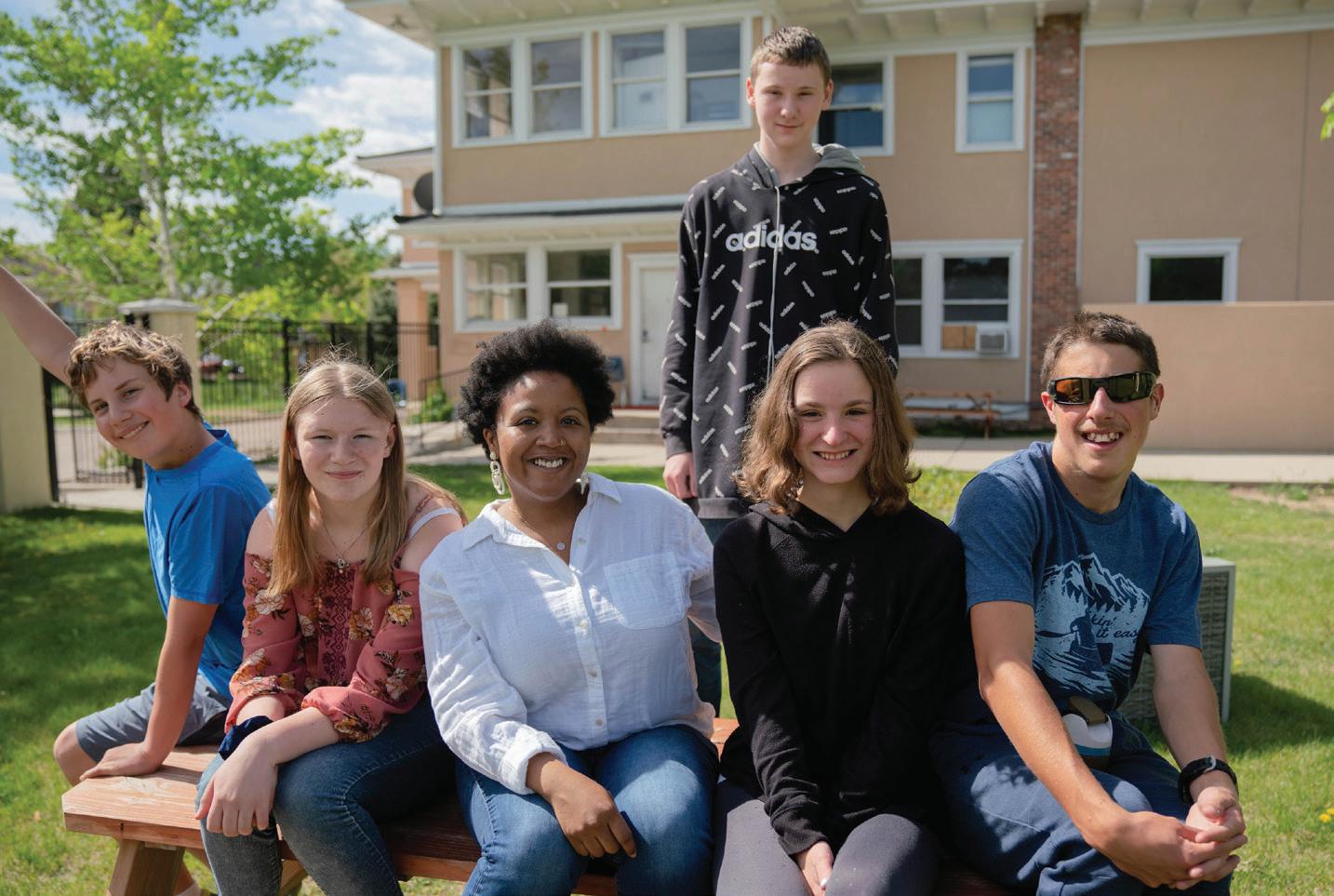
Mid-pandemic, in May 2020, Ziegler started at the Joshua School, which provides small-group instruction and hands-on learning skills for youth with autism in a beautiful Victorian home. “At the Joshua School, I was really able to focus on the power of relationships, especially studentteacher relationships and how those directly translate to how much students are able to learn and retain.”
Ziegler’s students at the Joshua School taught her the importance of flexibility, patience, and having fun with teaching. “Flexibility is important because sometimes you just need to be able to adapt to whatever a student needs in the moment, even if that means that you need to throw your plan out the window. Patience is something that I have learned to appreciate too. Just taking a minute to stop and think about what is best for students is important. Finally, having fun is key. I make sure the learning is meaningful but also fun and engaging.”
After earning her principal licensure in May 2022, Ziegler became center director for STRIVE Prep at the Noel Campus this fall, where she oversees programming, case management, staff coaching, and meeting students’ accommodations and modifications through the school’s instructional leadership team.
“My time in CU Denver’s special education program was life changing for me, not only in helping me discover my passion for education but also in realizing that we are all lifelong learners and that everyone should have access to that learning,” she said. “Special education professionals make sure that education is equitable and accessible for everyone. Hands down, I would highly recommend the program to anyone.”
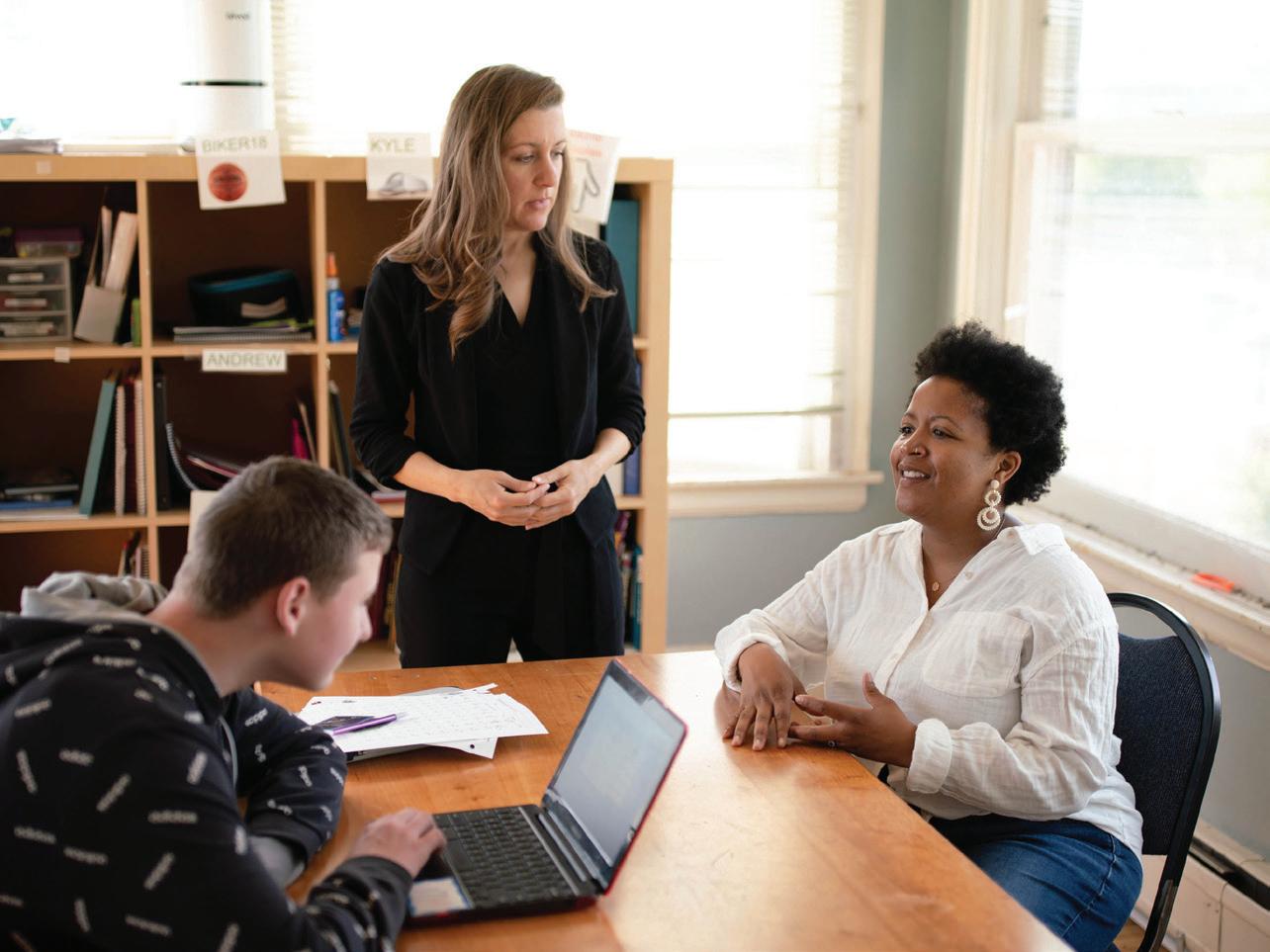
On May 3, former Dean Rebecca Kantor’s birthday, CU Denver unveiled a special space inside the SEHD. The Rebecca Kantor Digital Atelier stirs imagination, creativity, expressiveness, and style. Located in Room 1100 of the Lawrence Street Building, the atelier perfectly brings together Dean Kantor’s love of the Reggio Emilia approach to early childhood education and her passion for exploring the boundaries of digital teaching and learning. The atelier deconstructs the typical classroom and creates multimodal learning opportunities that engage the various senses. That same day, the CU System recognized Dean Kantor posthumously with the University Distinguished Service Award and Colorado Gov. Jared Polis made a Rebecca Kantor Day proclamation.
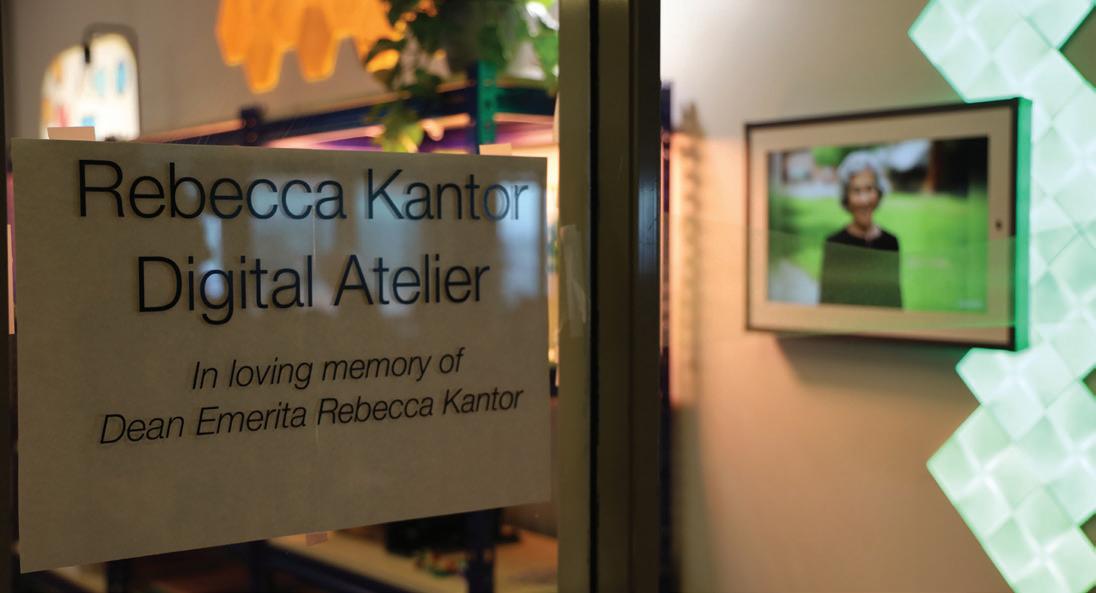
The CU Denver Learning Assistant Program celebrated its 10th anniversary of supporting STEM student success. Robert (Bud) Talbot, PhD, associate professor, STEM Education, and Laurel Hartley, PhD, associate professor, Integrative Biology, College of Liberal Arts and Sciences, launched the original program in spring 2012. Learning assistants are undergraduate students who have succeeded in a course and are subsequently recruited and help new students succeed in the course. Learning assistants, faculty, administrators, and guests from CU Boulder attended the anniversary celebration.
NxtGEN , an educator preparation program codesigned by Denver Public Schools (DPS) and CU Denver, has been elevated in a U.S. Department of Education fact sheet as one of eight teacher education programs in the country addressing the teacher shortage and increasing the number of teachers prepared for diverse classrooms. The fact sheet was released during U.S. Education Secretary Miguel Cardona’s call to states, school districts, and higher education institutions to address the nationwide teacher shortage and bolster student success.
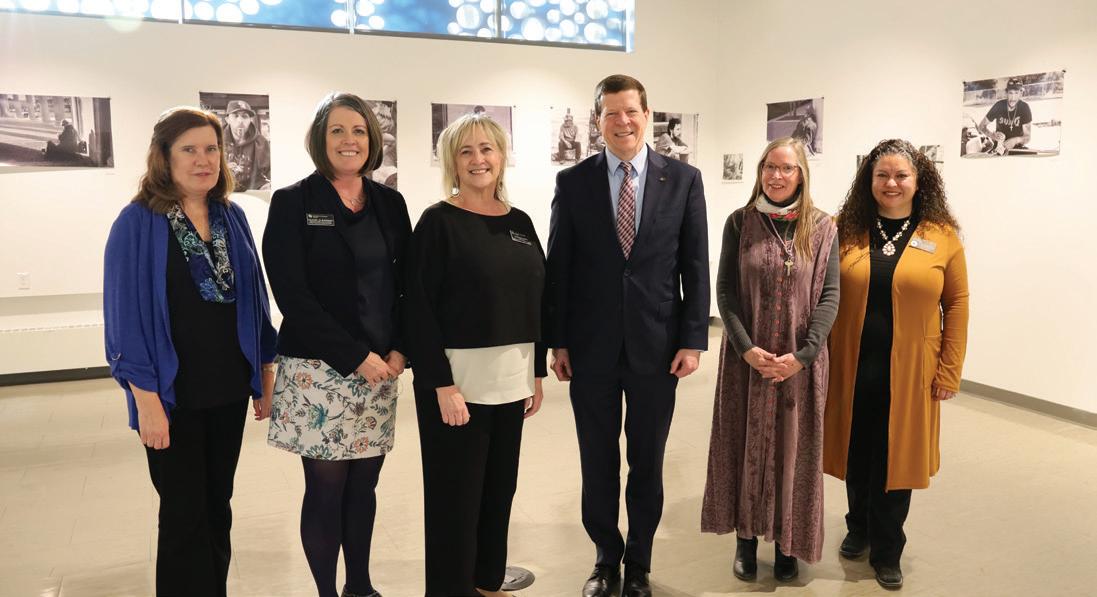
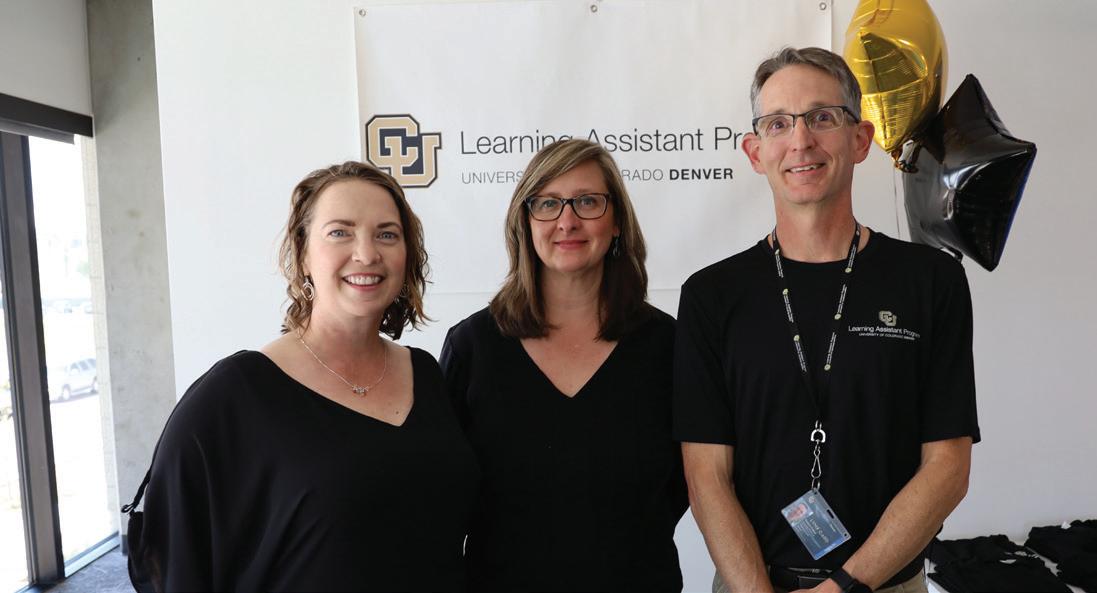
Northeastern Junior College (NJC) in Sterling joined the group of community colleges partnering with the SEHD to help curb Colorado’s dire teacher shortage. The expansion of the Partnership for Rural Educator Preparation (T-PREP) program allows students to complete a bachelor’s degree with licenses in early childhood, elementary, and special education in their entirety without leaving the greater Sterling region.
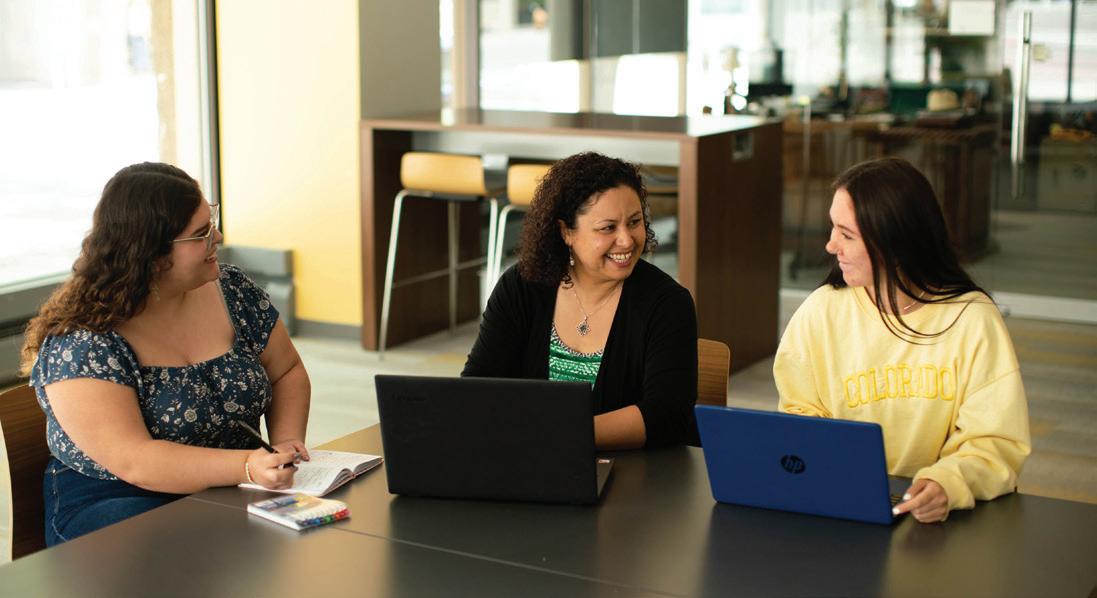
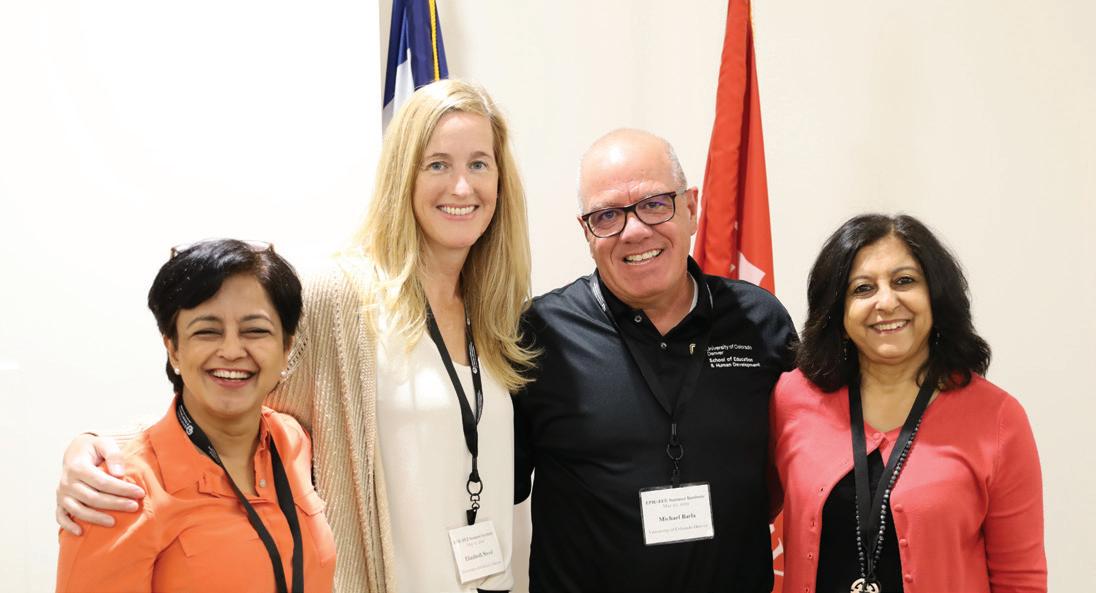
The EPIC-ECE Summer Institute on May 25 at Red Rocks Community College, planned by Michael Barla, EdD, Ritu Chopra, PhD ‘02, and Elizabeth Steed, PhD, at CU Denver, and Rashida Banerjee at University of Denver, and funded by the Office of Special Education Programs EPIC-ECE grant, drew 35 early childhood faculty members from across the state. Dorothy Shapland, EdD ’17, and Elmer Harris, EdD ’16, presented a timely keynote speech about stress and trauma for early childhood teachers. Nationally known researchers Julie Sarama, PhD, and Doug Clements, PhD, covered how to teach math to young children with and without disabilities, and faculty members shared how they were using the EPIC-ECE Bank of Resources to embed content on inclusion in their early childhood courses.
Margarita Bianco, EdD, earned the TIAA Chancellor’s Urban Engaged Scholar award, which recognizes the outstanding contributions of select CU Denver faculty to the metro Denver region through research and creative activities that drive our community forward. Through the Pathways2Teaching program she founded and directs, Bianco paves the way for students of color to seriously consider teaching as a profession. Bianco is a sought-after speaker regarding Grow Your Own teacher programs, including last March when she discussed the current state of Latinx students in higher education at the National Hispanic Caucus of State Legislators’ 19th National Summit in Washington, DC.
Lisa Roy (EdD ’16, School Administrator License ’15, Counseling MA ’96), who previously led early childhood education programming in Denver Public Schools from 2016 to 2019 and held leadership roles in several philanthropic organizations, now leads the state’s new Department of Early Childhood. In this role, she oversees early childhood programs previously housed in the state’s Department of Human Services and the Department of Education. Roy also directs efforts to launch Colorado’s new universal preschool program in the summer of 2023 and help the hard-hit childcare industry.
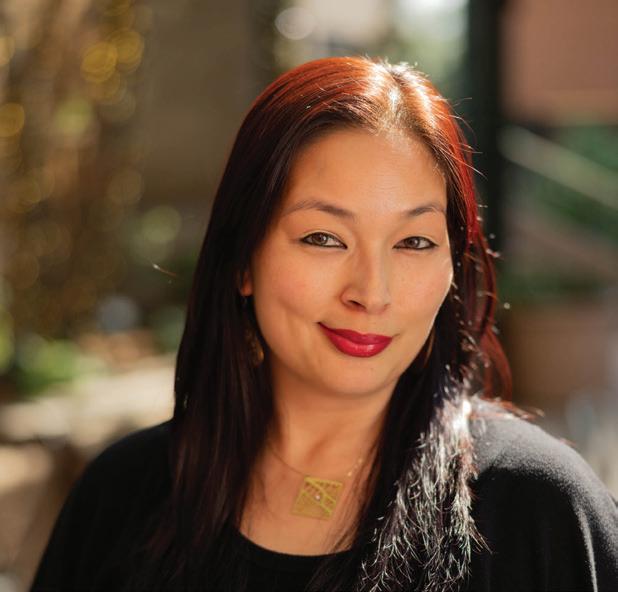
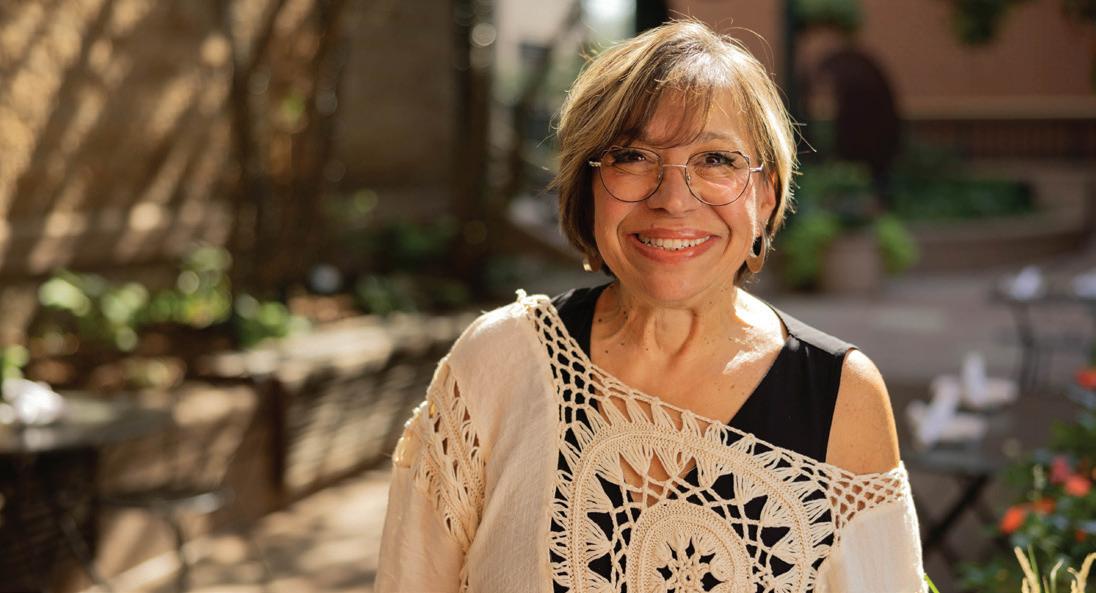
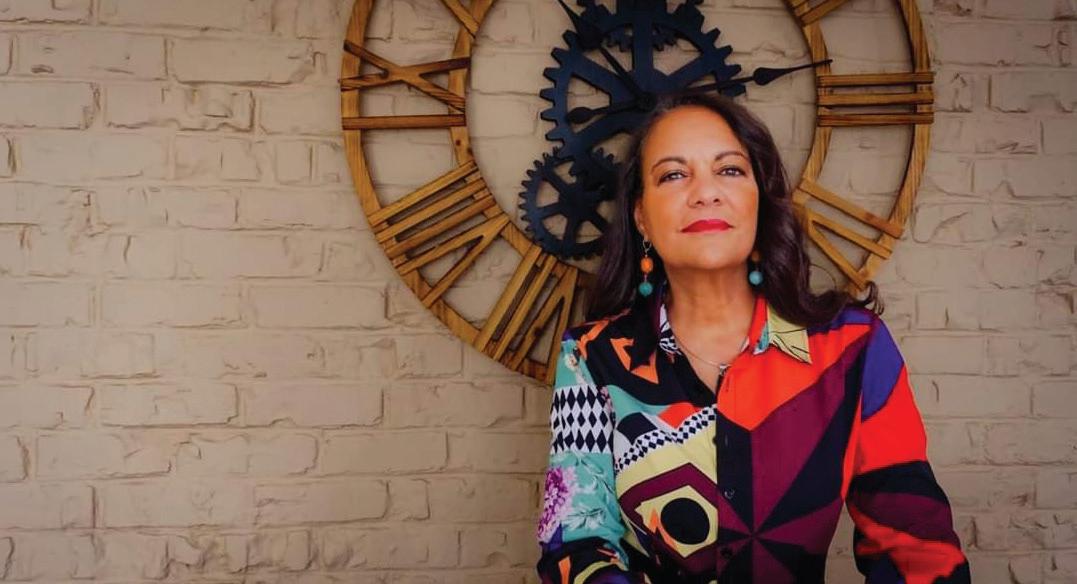
Robin Brandehoff, PhD ’20, assistant clinical professor in the Culturally and Linguistically Diverse Education program and recipient of the American Education Research Association’s 2021 Outstanding Dissertation Award, received a research grant of $12,000 for work in Oahu to further develop a pedagogical framework she has created called Hanai Pedagogy. She is partnering with a Grow Your Own teacher education program called INPEACE. Her study is titled “Hanai Pedagogy: How Educators of Color Haku Learning Through Cultural Identity, Language, and Kanaka ‘Oiwi Traditions in Hawai’i.”
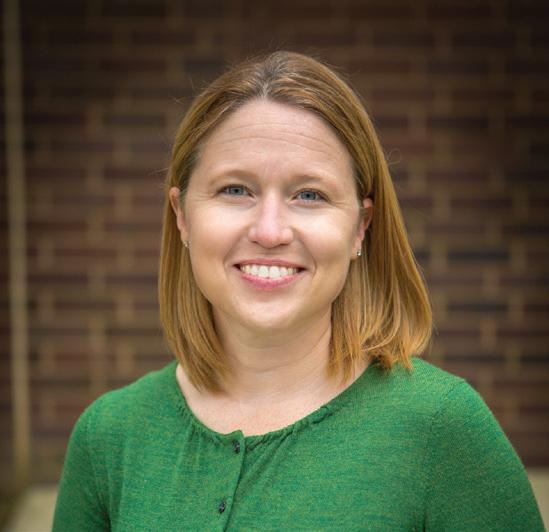
The SEHD warmly welcomes a talented group of 11 new faculty members. This is the largest group of faculty hired at one time. They represent a broad range of professional and personal experiences and will add significantly to the diversity of our faculty. Their life experiences and research interests will fuel the dynamic learning environment in our school. Dean Lynn is grateful to associate deans Scott Bauer, PhD, Dorothy Garrison-Wade, PhD, and Barbara Seidl, PhD, for their leadership during the search processes.
JENINE “NINA” BUCHANAN, clinical associate professor in the Leadership for Educational Organizations (LEO) higher education program, earned her EdD in higher education administrative leadership from Widener University. She comes from Wilmington University, where she was an associate professor. Her research focuses on advising and mentoring higher education professionals.
DÈSA DANIEL, assistant professor in the Counseling program, received a PhD in counselor education and supervision from the University of New Mexico. She is a licensed mental health counselor in New Mexico. Daniel’s research interests focus on supervision relationships for racial/ethnic minorities, the lived experiences of racial/ethnic college students, and the experiences of Black/ African American womxn in academic spaces. Daniel advocates for inclusive spaces for racial/ethnic minority students within academia and within organizations for increasing graduate student resources.
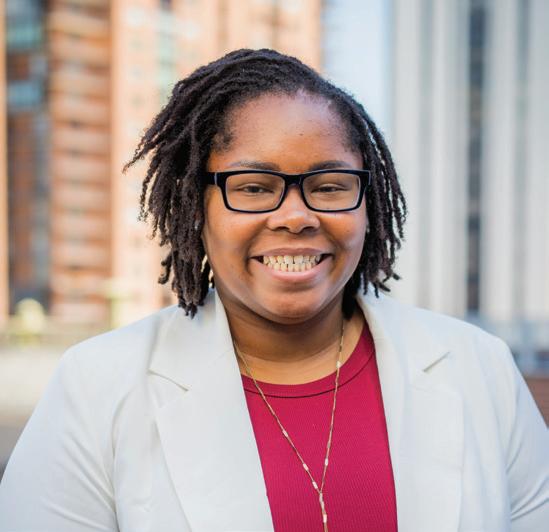
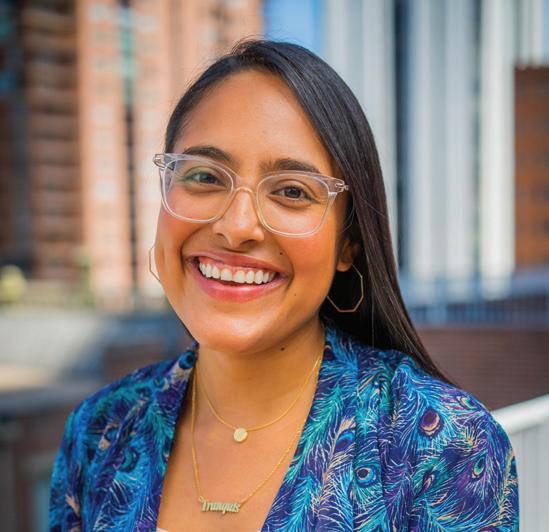
ESTER DE JONG, professor in the Culturally and Linguistically Diverse Education program, was raised in the Netherlands and earned her EdD in literacy, language, and cultural studies from Boston University. Most recently, she was a professor at the University of Florida. This former president of the TESOL International Association has authored more than 90 publications. Her research interests include equity and integration in dual language education and teacher preparation for bilingual learners.
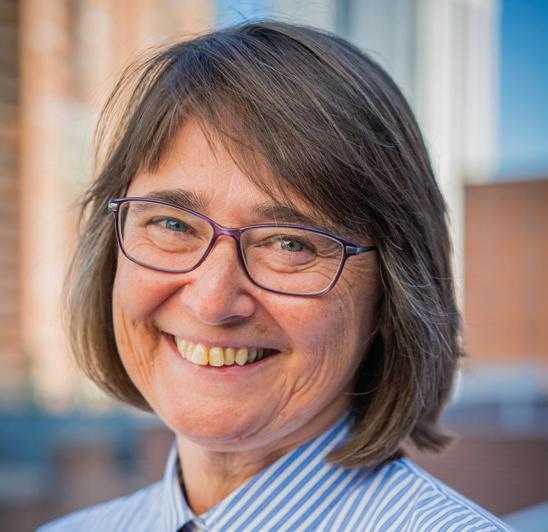
JENNIFER CAMACHO TAYLOR, clinical assistant professor in the Human Development and Family Relations program, earned her PhD in educational psychology with a concentration in human development and family science from the University of North Texas (UNT). She most recently served as a teaching fellow at UNT. Her research interests include human development, racial ethnic socialization, racial trauma, and symptomology.
RASHMI GANGAMMA, associate professor in the Couple and Family Therapy program, grew up in India and earned a PhD in human development and family science with a specialization in couple and family therapy from The Ohio State University. She comes to SEHD from Syracuse University, where she was an associate professor. Her research focuses on relational ethics in couple and family therapy, and culturally responsive systemic interventions for resettled refugees with multiple intersecting identities.
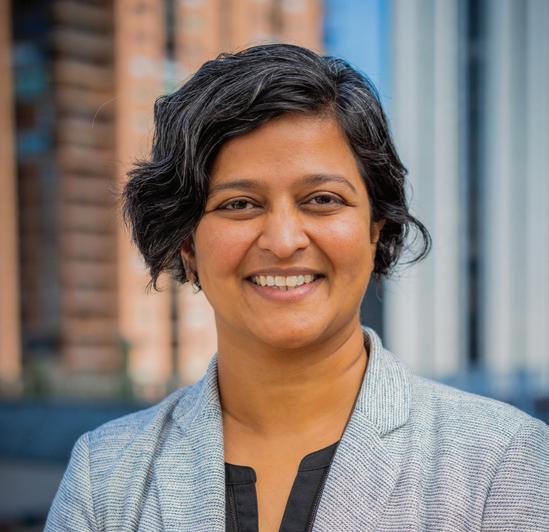
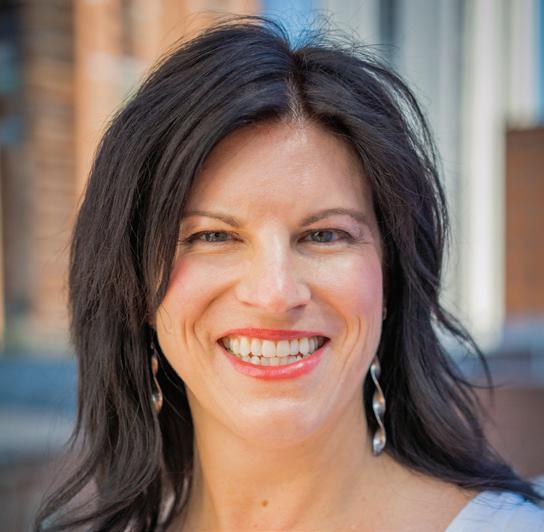
ERICA HOLYOKE, assistant professor in the Responsive Literacy Education program, received her PhD in curriculum and instruction, with an emphasis on language and literacy studies, from the University of Texas at Austin. She comes to SEHD from Keene State College, where she was an assistant professor. Her research focuses on culturally sustaining pedagogical practices and restorative justice in literacy education.
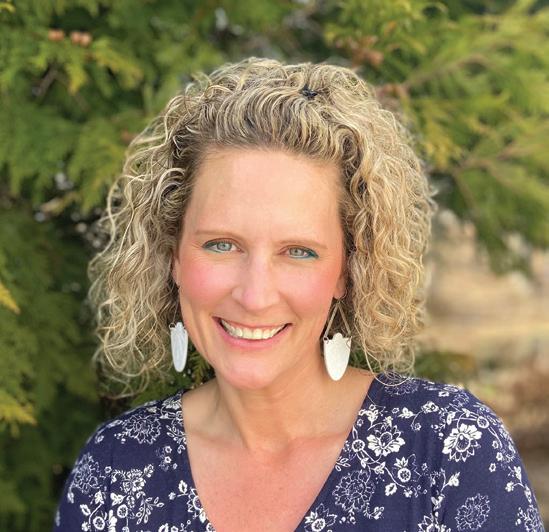
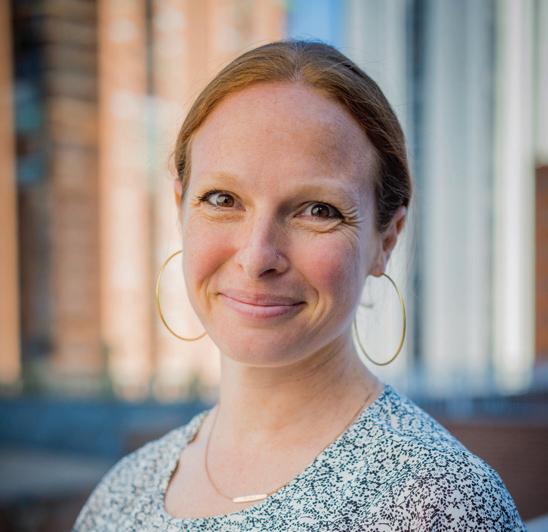
CHÉLYNN RANDOLPH, clinical assistant professor in the Couples and Family Therapy program, earned her PhD in marriage and family therapy from Florida State University (FSU), where she was a McKnight Dissertation Fellow. Most recently, she was an instructor at FSU and a psychotherapist in private practice. Her research interests include destigmatizing therapy in communities of color and using interrelatedness to strengthen couples.

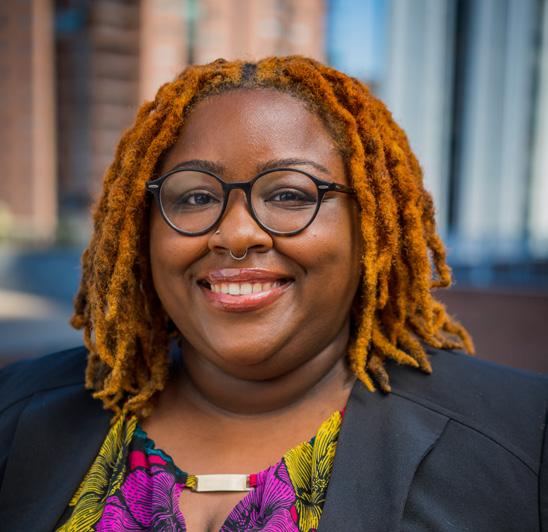
RENÉE WILKINS-CLARK, assistant professor in Human Development and Family Relations, earned her PhD in applied family science and a certificate in social justice education from Kansas State University (KSU). Most recently, she was a graduate teaching and research assistant at KSU. Her research interests include family dynamics and the ways in which familial processes are influenced by societal and structural forces, specifically family transitions and trauma.
KATIE L. JONES has been promoted to a full-time alternative licensure instructor for ASPIRE to Teach after serving in part-time roles as assistant alternative licensure instructor and as an independent contractor for professional development since 2015. Her experience also includes key roles with Quinsigamond Community College, Harvard University’s Cambridge Harvard Summer Academy, New Jersey Center for Teaching and Learning, the College of the Holy Cross, and Denver Public Schools. She earned her EdD from Northeastern University. Her research focuses on teacher leadership, retention, and urban schools.
TOM “YILE” SU, clinical assistant professor in the Couples and Family Therapy program, grew up in China and earned his PhD in marriage and family therapy from Florida State University. His dissertation explored how relational cultural intelligence leads to successful intercultural relationships. His other research interests include Asian and Asian American families, sexual and gender minority relationships, and general relationship development processes.
SARAH WOODARD, senior instructor in the Responsive Literacy Education program, earned an MA in literacy, language, and culture from CU Denver and has been highly involved in leadership roles for the National Writing Project, the Denver Writing Project, and the Literacy Design Collaborative. Her publications and presentations explore teacher and student civic mindedness through personalized learning and writing.
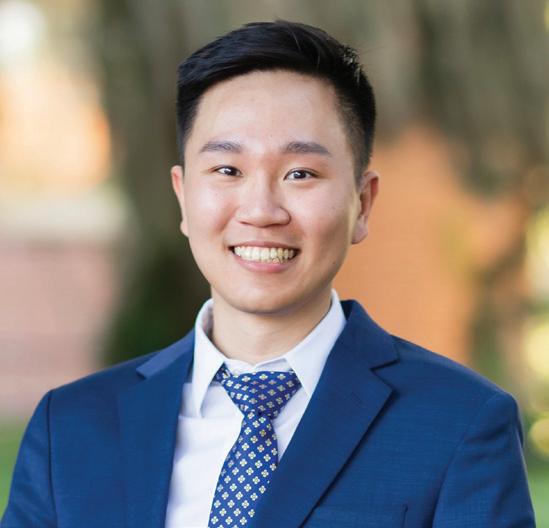
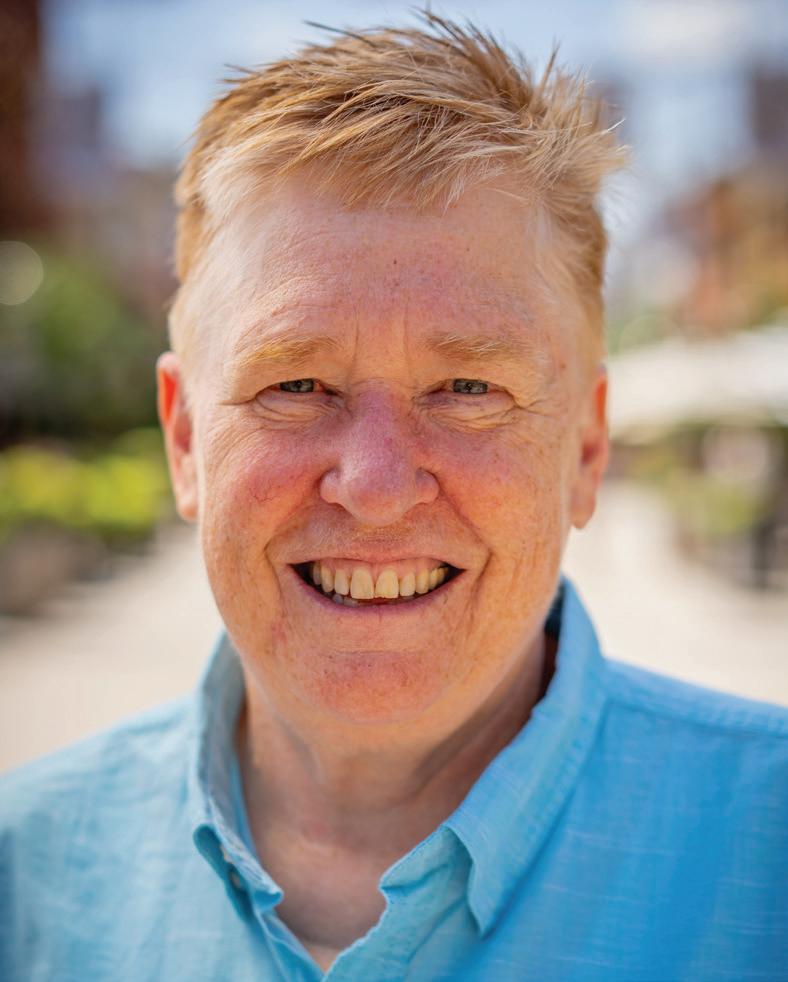
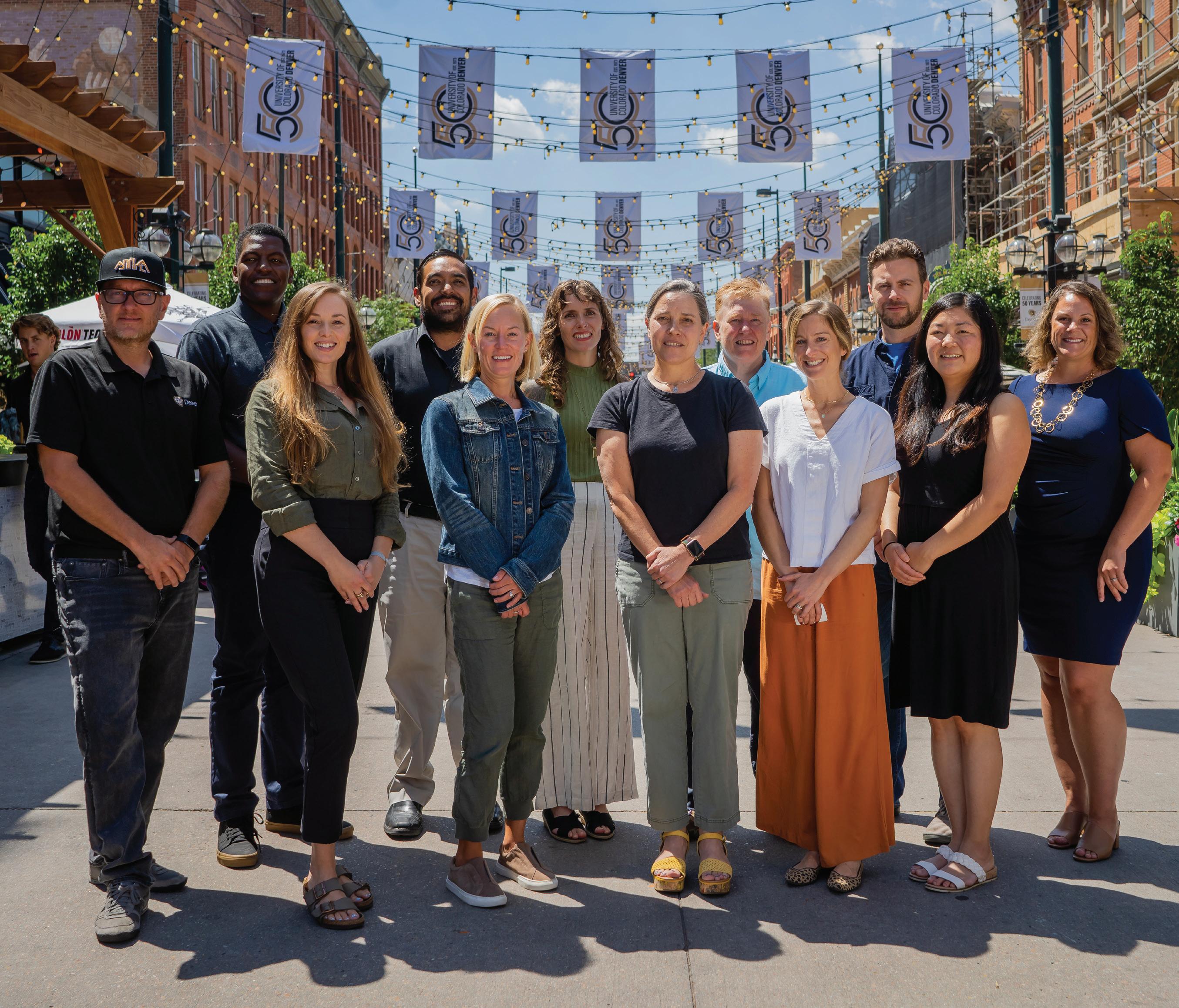
The reach currently spans 104 school districts of all sizes, representing 58% of the state’s districts.
This highly personalized and low-cost option is designed for individuals living in Colorado who already have earned a bachelor’s degree and wish to pursue a teaching career. Participants experience a yearlong on-the-job preparation while earning a salary as a teacher in a school.
According to Suzanne Arnold, PhD, executive director of ASPIRE to Teach, the program was established in 2012 at the request of Teach for America (TFA) leadership. They wanted to continue their partnership with CU Denver and hoped the university would become a designated alternative licensing agency for new teaching enthusiasts and continue providing master’s degrees to TFA graduates.

Arnold met with the Colorado Department of Education, completed their robust application, and rejoiced when ASPIRE to Teach was accepted as a designated agency. Next, she leveraged her experiences as an assistant clinical professor in teacher education to build out the general education curriculum, which is rooted in tenets and principles found in CU Denver’s traditional teacher preparation program.
Since its creation, ASPIRE to Teach has helped Colorado’s school districts address teacher shortages and high-need gaps.
“As a rolling admissions program, we’re here to provide service to school district superintendents and human resources teams across Colorado who need to get individuals licensed to teach,” said Arnold. “We are known as a high-quality, relationship-driven program. We pride ourselves on our customer service. We genuinely care. Most of our new candidates come to us through positive word of mouth. If someone has a school district job, and they need an alt license, we take them under our wings and go from there.”
ASPIRE to Teach attracts diverse high achievers, many of whom already have advanced degrees and are changing careers. The program uses technology in innovative ways to reach prospective teachers across Colorado, including rural communities. The reach currently spans 104 school districts of all sizes, representing 58 percent of the state’s districts. Denver Public Schools currently has the largest teacher candidate representation, followed by Douglas County School District, Harrison School District, STRIVE, and DSST Charter Networks. The program impacts all types of schools—public, private, charter, innovation, rural, facility, early childhood, and the Department of Youth Services and Corrections. About 25 percent of ASPIRE alumni return to CU Denver to obtain MA degrees, impressive considering that another 25 percent of teacher candidates enter the program with advanced degrees.
ASPIRE to Teach endorses all qualifying content areas, except teacher librarian. Popular endorsements include high-need fields, such as math, science, elementary education, and English. They also include Special Education K-21 generalist, a program area built by Jennifer Fox, EdD, in 2013. Fox started with ASPIRE in 2013 as an instructor and now serves as the director. In addition, ASPIRE provides endorsements for high-demand electives, including visual arts, physical education, music, drama, and computer science.
“The average age of students in the program is 34. Career changers are coming from the STEM field from jobs such as engineering, scientific laboratory research, and the military,” said Arnold. “Most do not have the luxury of taking a year off, of not earning an income. They need to find a quick entry point into teaching. That is the beauty of alt license. These science and math candidates can immediately move into a new career while they are enrolled in our program, and get the support they need to be successful and develop as a teacher. As for our elective students, they have incredibly interesting backgrounds, including a women’s Colorado badminton champion and a Broadway touring musician.”
Facing page: The Aspire to Teach team and Suzanne Arnold. Above: Jennifer Fox
One of the things that might be surprising about ASPIRE is that faculty members do not give grades. Instead, they use formative and summative feedback, modeling how they would creatively teach students while working toward achieving desired results and competencies.
Some ASPIRE to Teach contracted employees are former students in the program. This includes Michael Machado, an instructional coach in social studies for Adams 12 School District. The retention rate among full-time faculty has been 100 percent in the last nine years.
“You can feel the passion that the ASPIRE faculty have for what we are doing. We are a collaborative group who love each other and our students,” said Arnold.
“It’s truly a community.”
Arnold and her team believe the 10th anniversary can serve as both a time of celebration and a call to action. “There’s a great need for teachers. We astound all partnering school districts with our high-quality offering led by pedagogical experts. We look forward to making future connections and will travel to your school district to create plans.”
For more information, visit https://education.ucdenver.edu/aspire.
School of Education & Human Development
Campus Box 106 PO Box 173364 Denver, CO 80217-3364
Share your story at 50.ucdenver.edu.

